

Is Working On A Yacht Worth It? Here’s What You Should Know

Have you ever dreamed of working on a yacht, and sailing the world’s most beautiful seas? It may sound like a glamorous job, but is it really worth it? Working on a yacht is a unique experience, and it can be incredibly rewarding for those who are ready for the challenges and opportunities that come with the job.
In this article, we’ll explore what it takes to be a yacht crew member and discuss the benefits, qualifications, challenges, and risks that come with the job.
We’ll also dive into the cultural and financial rewards that come with working on a yacht.
So if you’re looking for a job that will take you around the world, read on to find out all you need to know about working on a yacht.
Table of Contents
Short Answer
Working on a yacht can be a great experience for many people.
It can provide a unique opportunity to travel, learn new skills, and meet people from all over the world.
However, it can also be hard work, with long hours and the possibility of seasickness.
Whether or not it is worth it depends on the individual and their goals.
What Are the Benefits of Working on a Yacht?
The benefits of working on a yacht are numerous and varied.
For starters, there is the chance to explore some of the worlds most beautiful locations, and to live and work in a unique environment, often surrounded by breathtaking scenery.
Working on a yacht can offer an escape from the daily grind, with flexible hours and the opportunity to meet new people and experience different cultures.
Additionally, there is the potential to earn a good salary, as many yacht jobs come with a generous pay package.
For those looking to explore the world while gaining valuable job experience, working on a yacht can provide an ideal opportunity.
Not only will you be able to travel to some of the most exotic and remote locations, but you will also be able to learn valuable skills such as navigation, maintenance, and hospitality.
Working on a yacht can also offer the chance to build a strong network of contacts, as you will be in contact with other crew members and travelers from all over the world.
Finally, the lifestyle associated with working on a yacht can be incredibly rewarding.
You will be able to meet interesting people, explore different cultures, and gain a unique insight into how the world works.
You will also be able to enjoy the simple pleasures of life, such as swimming, sunbathing, and spending time with friends and family.
What Sort of Qualifications or Experiences Are Needed to Work on a Yacht?

Working on a yacht is a unique and exciting experience, but it’s important to understand the qualifications and experiences needed to land one of these jobs.
Most positions require at least a minimum of boating experience, either through the military or through a recreational certification.
Those looking to work in the galley or as a steward may need culinary or hospitality training.
Those interested in engineering positions should have a degree in engineering or a related field.
There are also positions available for those with medical training, such as nurses and paramedics.
In addition to the necessary qualifications, having a valid passport and the ability to travel are essential for working on a yacht.
Most jobs require that you be able to leave at a moment’s notice and stay away for extended periods of time.
You should also be comfortable living in small spaces and working in close quarters with other crew members.
Communication, teamwork, and problem-solving skills are also important for a successful career on a yacht.
Finally, having the right attitude is an important factor in securing work on a yacht.
Employers are looking for crew members who are friendly and outgoing, as well as those who are willing to take initiative and take on responsibility.
They also want someone who is eager to learn and can adapt to the ever-changing environment of the sea.
Having a positive attitude and an open mind is essential for success in this field.
What Are the Challenges of Working on a Yacht?
Working on a yacht might sound like a glamorous opportunity, but there are some challenges as well.
From long hours to physical labor to living in confined spaces, there are some drawbacks that potential crew members need to consider.
One of the biggest challenges of working on a yacht is the long hours.
Many positions require crew members to work long shifts, with some jobs requiring up to 12-hour days.
In addition, crew members often have to be on call at all times, meaning their sleep can be disrupted if theres an emergency.
Physical labor is another challenge of working on a yacht.
From stocking shelves and cleaning cabins to running lines and fixing equipment, crew members often have to do a variety of manual labor tasks.
This can be difficult for some people, especially those who are not used to physical labor.
Living on a yacht can also be challenging.
Yachts are often cramped and uncomfortable, with limited space to move around.
This can be difficult for those used to having their own space.
In addition, crew members have to adjust to living in close quarters with others and may have to share a cabin or bunk.
Finally, being away from home can be a challenge.
Working on a yacht means being away from family and friends for long periods of time.
This can be difficult for some, as it can lead to feelings of loneliness and homesickness.
Ultimately, working on a yacht can be a rewarding experience, but its important to consider the challenges that come with it.
From long hours and physical labor to cramped living quarters and being away from home, there are some drawbacks that potential crew members need to be aware of.
What Are the Opportunities for Professional Development?

Working on a yacht can be a great opportunity for professional development.
Those who take on a job on board a yacht can expect to gain valuable skills and experience that they can use in their future career.
For instance, working on a yacht requires individuals to have excellent customer service skills, as they will be interacting with guests and crew members on a daily basis.
Additionally, those who work on a yacht can learn valuable navigation and navigation-related skills, as well as the ability to work with a wide variety of electronic and mechanical equipment.
Working on a yacht also requires individuals to be able to think on their feet and solve problems quickly, which is a valuable skill for any career.
Finally, working on a yacht provides individuals with the opportunity to develop their interpersonal skills, as they will be working in close proximity with other crew members.
Therefore, working on a yacht can provide individuals with the chance to hone their existing skills and learn new ones that can help them in their future career.
What Are the Potential Risks?
When considering working on a yacht, people should also be aware of the potential risks and costs associated with it.
While there can be great rewards, there can also be significant risks.
For example, the weather can be unpredictable and dangerous, and the boat may encounter mechanical problems or run aground.
The costs of maintenance, repairs, and supplies can be high, and there is a risk of job insecurity due to the nature of the industry.
Additionally, living aboard a yacht for extended periods can be uncomfortable and physically demanding.
People should weigh the potential risks carefully before deciding if working on a yacht is worth it for them.
What Are the Financial Benefits of Working on a Yacht?

When it comes to considering the financial benefits of working on a yacht, the first question that usually comes to mind is: How much money can I make? The answer to this question depends on the type of job you are looking for, as well as the size, age, and location of the yacht you are working on.
Generally speaking, working on a yacht can be a lucrative opportunity.
Many yacht crew members are paid a generous salary, along with other benefits such as food, lodging, and medical insurance.
Depending on the job, you may also receive bonuses and other perks such as travel allowances, clothing allowances, and even a share of the profits.
In addition to a salary, many yacht crew members also receive tips from the guests they serve.
Tips can range from a few hundred dollars to several thousand, depending on the type of trip and the size of the yacht.
Tips can add up quickly and can be a great way to supplement your income.
Finally, many yacht crew members are eligible for a variety of tax deductions, including costs associated with maintaining the boat.
This can include expenses such as fuel, repairs, and supplies.
By taking advantage of these deductions, you can significantly reduce your tax burden, making working on a yacht even more profitable.
Ultimately, the financial benefits of working on a yacht depend on the type of job you are looking for and the size, age, and location of the yacht you are working on.
With the right job and the right yacht, working on a yacht can be an incredibly rewarding and profitable experience.
What Are the Cultural Benefits of Working on a Yacht?
Working on a yacht can provide a unique cultural experience that is hard to find elsewhere.
People who work on yachts get to explore exotic locations, enjoy different cuisines, and immerse themselves in different cultures.
It is a great opportunity to learn about different cultures, meet new people, and broaden horizons.
The crew on a yacht is usually made up of people from all over the world, which allows for a rich cultural exchange.
People working on a yacht can learn about different cultures and share their own.
This exchange of cultures and knowledge can be a great way to expand one’s worldview and gain a greater appreciation for different lifestyles.
The lifestyle of working on a yacht is also attractive to many.
People who work on yachts often experience a more relaxed lifestyle than they would otherwise.
There is no need to rush to work in the morning, and people typically have more free time than they would in a more traditional job.
This allows them to explore more of the world and learn more about different cultures.
Working on a yacht is a unique experience, and it can provide a great opportunity to learn about different cultures.
Those looking to gain a greater appreciation for the world and learn more about different cultures should consider working on a yacht.
It can be a rewarding and exciting experience that is well worth it.
Final Thoughts
Overall, working on a yacht is a unique experience that offers many rewards and benefits, such as travel, flexibility, and the chance to meet new people.
That said, its important to weigh the risks and costs against the potential rewards, as well as understand the qualifications and experiences needed to find a job and stay safe.
If youre looking for a change of pace, a more flexible lifestyle, and the chance to explore the world, then working on a yacht could be a great opportunity for you.
Do your research, stay safe, and keep sailing!.
James Frami
At the age of 15, he and four other friends from his neighborhood constructed their first boat. He has been sailing for almost 30 years and has a wealth of knowledge that he wants to share with others.
Recent Posts
When Was Banana Boat Song Released? (HISTORICAL INSIGHTS)
The "Banana Boat Song" was released in 1956 by Harry Belafonte. This calypso-style song, also known as "Day-O," became a huge hit and remains popular to this day for its catchy tune and upbeat...
How to Make Banana Boat Smoothie King? (DELICIOUS RECIPE REVEALED)
To make a Banana Boat Smoothie King smoothie at home, start by gathering the ingredients: a ripe banana, peanut butter, chocolate protein powder, almond milk, and ice. Blend the banana, a scoop of...
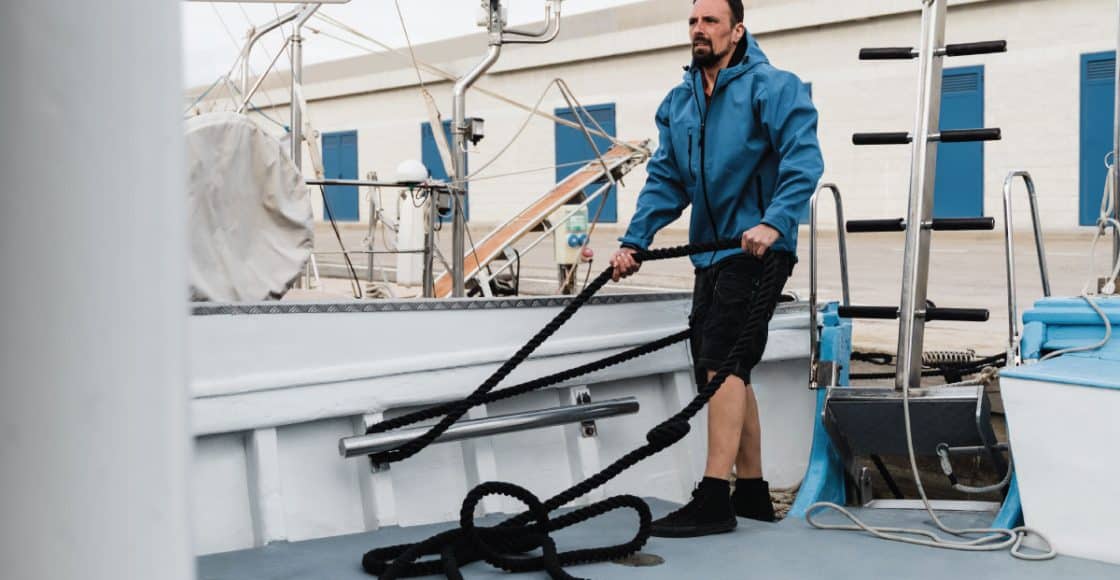
How to Work on a Yacht

Table of Contents
Last Updated on January 10, 2023 by Boatsetter Team
Working on a yacht is honest and good work; it also comes with many amazing perks:
- A one-of-a-kind workspace
- The ability to make industry connections
- Opportunities to move up
Ultimately, how to work on a yacht involves tremendous dedication, along with a little luck. We can set you on the right path here and now.
Browse for yachts for rent on Boatsetter

1. Do your homework
Just as you had required reading while in school, work on a yacht requires understanding a lot of information about deck duties. A few books and websites can (pardon the pun) steer you in the right direction.
The Insiders’ Guide to Becoming a Yacht Stewardess and its companion website workonayacht.com are both by Julie Perry, a stewardess-turned-yacht-marketing consultant. Also check out crew -centric magazines like Dockwalk and newspapers like The Triton , along with their related websites.
2. Get your CV in order
A CV—curriculum vitae—is your resume and should summarize all relevant experience plus transferrable skills. Perry says if you grew up waterskiing or boating, be sure to mention how long you’ve been doing it. Transferrable skills, meanwhile, range from house painting to woodworking and even being a nanny to waiting tables.
Work on a yacht can and does involve maintenance skills and hospitality skills. “You really need to sell yourself on paper, or you won’t stand out,” she says!
3. Go where the yachts are
Fort Lauderdale is the Yachting Capital of the World due to the large yachts that frequent its waters and yachting businesses headquartered there. Fort Lauderdale is also the number-one location for proper training (more on that below) and housing while you job hunt.

4. Find a trainer
How to work on a yacht begins and ends with training. Everyone, whether you want to be a deckhand, a chef, or a steward/stewardess, needs STCW training at a minimum. STCW ( Standards of Training and Certification of Watchkeeping ) is internationally required for every seafarer, in fact.
Briefly, it certifies that you have a basic understanding of safety hazards at sea and can respond properly in emergencies. Bluewater and Savvy Maritime Academy are two well-respected training providers in Fort Lauderdale. Additionally, you need an ENG1 medical certificate, proving you’re fit to work at sea.
Obtain this before enrolling in training in case a medical condition could preclude you from working onboard . Find doctors who provide the exams and certificates on yachting-pages.com , a valuable resource for captains, crew, and the industry.
5. Go beyond the basics
“It’s going to make such a difference in your understanding of the industry and your confidence level,” Perry says, plus increase your chances of landing a job. She adds that most yachts and crew-placement agencies require a certificate of proficiency in security, for example.
If you want to be a deckhand, she continues, consider obtaining a tender-driving certificate. Stewards and stewardesses often enroll in wine and bartending courses, meanwhile.

6. Save money for costs
Perry strongly advises having $6,000 to $7,000 to cover at least two months’ worth of expenses in Fort Lauderdale. These include not just housing (which you can find on yachting-pages.com) but also training, transportation, and meals.
A five-day STCW basic course costs over $1,000, and an additional one-day proficiency in security course is $300.
7. Networking is key
Once you get your STCW, “it’s networking, networking, networking,” Perry says. Online bulletin boards like daywork123.com post new opportunities daily—which can go quickly, so check and register early. Another source, meridiango.com , lets you register, upload your CV, and record a video, then interview via their portal.
Training schools often lend a hand with job hunting, too. Old-fashioned dockwalking—literally walking the marinas—can land you a job as well, as can frequenting places where crewmembers hang out at night.
8. Know the rules
How work on a yacht involves adhering to strict rules about not just safety but also privacy. The larger the yacht, the more the owners and guests prioritize discretion. “If you think you’re going to be a social-media influencer while traveling around on a 200-footer in St. Tropez, forget about it,” Perry warns. Some yachts don’t permit posting pictures or details about the yacht and their movements on social media.
About Boatsetter
Boatsetter is a unique boat-sharing platform that gives everyone — whether you own a boat or you’re just renting — the chance to experience life on the water. You can list a boat , book a boat , or make money as a captain .
Put your boat to work— Start earning an avg. of $20K yearly with Boatsetter

A journalist with more than 30 years’ experience, Diane M. Byrne is the owner of MegayachtNews.com, a daily website educating American superyacht owners, buyers, and their circles of influence about the leading builders, designers, cruising destinations, and more. She founded the website in 2007 as the first, and still the only, American-focused online media outlet exclusively covering this market. It features all-original content, for real stories of real interest.
Diane is additionally one of the most-sought-after journalists for expert editorial coverage and commentary about not only superyachts, but also general boating and yachting. Her byline appears in Boatsetter.com, DiscoverBoating.com, and the magazines Luxury Guide, Ocean, Yachting, and Yachts International.
Additionally, Diane is the Chair of the U.S. Superyacht Association, having been on the Board of Directors since 2015. Outside of yachting, she’s a trustee of Sempre Avanti, a non-profit resource supporting Italian and Italian-American individuals, businesses, and organizations in the United States and Italy.
Browse by experience

Explore articles

What Should You Do If Your Boat Capsizes

5 Best Shallow Water Boats for Navigating & Fishing Skinny Waters

Lake Travis Water Activities

Tybee Island Water Activities & Destination Guide

Guide to Becoming a Yacht Stewardess Working on Superyachts
Pin this post for later!
This working on superyachts guide is a authored by Carryn.
Working on superyachts seems glamorous, right? Your office overlooks crystal clear waters and your job involves stepping into the life of the rich and famous.
Not to mention, you get paid a fortune whilst doing so! But, as with most things in life, there’s more to the yachting industry than what meets the eye.
This guide details all the steps to getting a job working on a super yacht and what life is really like as a yacht stewardess — the good, the bad and the ugly!
Table of Contents
Before I Became a Yacht Stewardess
After 6 months working on a superyacht, is it easy to get a job working on superyachts, connections within the yachting industry, other qualities needed to become a yacht stewardess, the salary for a yacht stewardness, 1. do you want to become a yacht stewardess or a deckhand, role of a yacht stewardess working on a super yacht, role of a deckhand, other positions available for working on superyachts, 2. requirements for working on superyachts, 3. where to get a job: the mediterranean or the caribbean, 4. visa requirements for working on superyachts, 5. working on a private yacht vs a chartered yacht, 6. how to land that job as a yacht stewardess, register with yacht crew agencies, networking with other crew and yacht stewardesses, how much does it cost to work on a super yacht, what is life really like working on superyachts, how i got my job working on a superyacht, 1. how much time do you have to get a job, 2. do you believe in yourself, 3. are you ready to work your ass off every single day, how to become a ski instructor almost anywhere in the world, how to be a travel nanny and work as you travel, how to be an au pair in spain + tips for getting a job, how to work abroad & travel the world, how you can work abroad without experience so you can travel longer.
After graduating from college in South Africa, I jumped straight into the working world and started “adulting”.
After 3 months of long, hard work, with very little pay, I decided that I was tired of being broke and living in debt.
In an attempt to see just how versatile my skills were, I quit my job in search of greener pastures on the other side of the world, France. Here, I began what I thought would be a lifelong career as a yacht stewardess. I was intrigued by the idea of working on superyachts, how glamorous it all was and of course the MONEY.
Working as a yacht stewardess changed my life for the better. When I left for France I was a young, naive college graduate who struggled to find a balance between traveling and being financially independent.
6 months later, which is a lot earlier than I’d expected, I decided to throw in the towel. The money I’d made was amazing yet never gave me the job satisfaction I was actually looking for. I returned home with a new-found love for my country, my family and the smaller things in life.
Working on superyachts put my life into perspective.
It was an extremely personal time filled with self-reflection and allowed me to appreciate and value my own personal skills and work ethic.

Working on Superyachts: The Basics
A superyacht is a large luxury boat that’s longer than 24 meters. These yachts are owned by the rich and famous and often make their way between the Caribbean and the Mediterranean waters.
These superyachts need crew to provide them with that 1st class service. And this is where the thousands of yachties come into play.
People often confuse working on superyachts with that of working on cruise ships. No, they are not the same! Working on a superyacht is a far more intimate job. There can be two to twelve guests on board and you’re at their beck and call 24 hours a day, 7 days a week.
It’s a grueling job that will have you working long hours in confined spaces, but the rewards are far greater than those of the cruise ships.
Yes and no.
The yachting industry is a difficult one to get into, but once you have your foot in the door, you’re guaranteed future work and better positions. However, getting that first job working on a superyacht is the hardest part.
You will struggle to secure a job in advance as most captains and crew agencies want to meet you in person before they hire you. As a result, you need to go to the yachting hubs where you will spend your time job hunting.
Securing a job takes time. For some, it’s a matter of days, but for most, it takes weeks or even months.

The saying “It’s not what you know, it’s who you know” never rang so true as it does in the yachting world. If you have connections in the industry, you shouldn’t have a problem getting a job as a yacht stewardess.
The yachting industry is a small one and referrals are the easiest way to land your first job.
Owners want young, good-looking crew running around after them. As a yacht stewardess, your uniform consists of short skirts and tight shirts and you need to look presentable and professional at all times. If you fit this profile of a yacht stewardess, finding a job working on a superyacht will be a lot easier for you.
Your personality and drive also play a huge factor. Captains and owners want outgoing, energetic and friendly crew who will get on well with the rest of the team.
You have very little personal space and whilst conflicts are bound to happen, you will have to master the art of the “smile and walk away” and avoid confrontations with other crew and guests.
So yes, getting a job working on superyachts isn’t easy, but if you have the above points covered, I bet you could get a job!
The starting salary for a yacht stewardess or deckhand is roughly 2,500€ per month. This is with no experience and excludes 10% tips — which you receive on chartered trips. These tips could quite easily match your base salary. And it’s all tax-free!
You have no rent to pay as you live on board the boat. Your meals are prepared for you by the qualified chef, and you don’t need to purchase any groceries or toiletries.
EVERYTHING is covered. What I saved in 5 months whilst working on superyachts has taken me a full year to make as an English Teacher in Korea !

Sounds too good to be true, doesn’t it?
How to Work on a Superyacht: 6 Steps
Each of these superyachts needs 6-10 crew who all work together to ensure the smooth running of the luxury vessel. There are many positions available ranging from engineers to chefs but most crew start off as either a yacht stewardess or a deckhand.
As a yacht stewardess or stew, as it’s more commonly referred to, your main tasks are housekeeping and ensuring that the interior of the yacht is properly maintained. You need to provide the highest standards of hospitality and ensure that the guests are taken care of. To put it bluntly, you’re a glorified maid wearing a cute outfit!
Daily Tasks of a Yacht Stewardess
As a yacht stewardess, your daily tasks whilst working on a private yacht include meticulous cleaning of the interior of the boat such as the cabins, toilets and living areas. You’re responsible for all the laundry, ironing as well as flower arranging, and table setting for all meals.
You need to provide a silver service dining experience and make world-class cocktails whenever the guests request. If there are children on board your yacht, you may also be asked to keep them entertained whilst ensuring all your other tasks are completed.
Working Hours
Your days start when the first guest awakes and end when the last guest goes to bed! If they’re out clubbing until 4 am, you’ll have to stay up to welcome them back on board and perhaps serve them drinks upon their return.
There are no free weekends if you’re on charter and you rotate shifts with the other crew, who also work just as hard. Because of this, the hours are long and tiring and if you have demanding guests, you could feel completely broken by the end of it.
The workload and the sort of work changes depending on the season, whether you have guests on board and any maintenance issues.
The deckhand’s position is more geared for men and includes maintaining the exterior of the yacht as well as all the deck equipment. You scrub the boat, top to bottom and it’s a physically demanding role. Tasks include cleaning the engine, painting, and varnishing the deck. You’re in charge of the fenders and ropes as well as the tenders and jet skis.
Perhaps you’re a qualified chef, engineer or beautician. These jobs are also available but with no prior yachting experience, you will struggle to find positions available.
You may want to apply as either a yacht stewardess or deckhand first, and highlight these additional skills in your CV. This is because there are more opportunities for stews and deckhands. Captains will also be reluctant to hire a chef or engineer who’s doesn’t have experience working on superyachts as the demands are different from those of the normal day job.
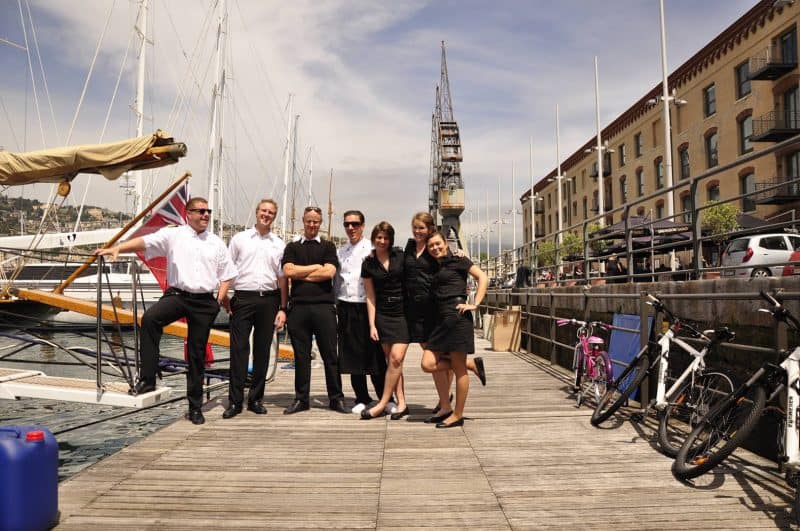
To find a job working on superyachts, there are a few basic requirements that you need to meet.
STCW stands for Standards of Training, Certification, and Watchkeeping for Seafarers. There are 5 modules that need to be completed within this required course. These include:
- Personal Safety & Social Responsibilities (PSSR)
- Fire Fighting
- Personal Survival Techniques (PST)
- Proficiency in Designated Security Duties (PDSD)
Eng 1 (Seafarer Medical Certificate)
This is an exam to ensure you don’t suffer from any existing medical condition that may deter you from performing your job. You’ll be required to take a urine sample and a doctor will perform a physical exam to ensure you have no issues with your sight or hearing.
Additional Courses to Work on a Superyacht
Once you’ve secured your position, your chief stewardess or captain will conduct proper in-house training to ensure you know how to work on a yacht and complete the tasks to their standards.
The below courses will prepare you for your new job and will add value to your yachting CV, but they are costly and are not a requirement.
- Stewardess courses where they cover interior care skills, silver service, table setting, cocktail service as well as flower arranging.
- Food Safety Certificate Level 2 . This certification applies to crew working on MLC compliant yachts. Service personnel such as chefs and yacht stewardesses working out of the galley will need this food hygiene certification.
- Powerboat Level 2 allows you to ride the tender and is beneficial for deckhands.
There are 2 yachting seasons: The Mediterranean and the Caribbean Season.
Each of these areas has yachting hubs where crew base themselves when looking for work. These towns are filled with aspiring yachties all gunning for the same position. Once the season is complete, your yacht may move to warmer waters or dock in the harbor until the winter season has passed.
The Mediterranean Yachting Season
The yachting season in the Mediterranean starts as early as April where these superyachts start crewing up and the season continues until August. The main hubs to look for work in the Mediterranean include Antibes in France and Palma de Mallorca in Spain.
The Caribbean Yachting Season
The Caribbean season is active all year round with September to March being the busiest months. Ft. Lauderdale in Florida is the main hub which attracts hundreds of crew every year. From here the boats move toward Antigua and St. Maarten in the Caribbean and as well as the Bahamas where guests enjoy the crystal-clear waters and tropical islands.
- Caribbean: If you’re heading to the United States of America, you’ll need a B1/B2 Visa.
- Mediterranean: A Schengen visa is required if you are going to France or Spain.
- Seaman’s Book: Once you find a job working on a super yacht, you need to arrange a seaman’s book. This is recognized as proof that you are working on a yacht and is also a compulsory document when applying for a transit visa.

There are two kinds of superyachts: Private yachts and chartered yachts.
Private Yachts
Private yachts are used exclusively by the owner.
In some cases, the owner may use the yacht a few times a season and so the crew will have a more relaxed schedule. But don’t take this for granted. I spent 5 months working on a private yacht and had guests on board every day!
Chartered Yachts
Chartered yachts are hired by groups of people for a shorter duration.
You usually have a day or two to get the yacht ready for each charter. This means that the guests are always changing, and the routes are very busy. However, it’s standard for the crew to receive 10-20% tips from the guests. Not too bad if you ask me!
So you’ve completed your yachting courses and you’ve decided whether you’re going to the Mediterranean or the Caribbean. Flights are booked, and visas have been organized. Now, you need to get a job working on a superyacht.
Find a Crew House for the First Week After Your Arrival
These crew houses are like hostels catering for new yachties. They are slightly more expensive than other accommodation you can find. However, it’s worth staying in a crew house for the first week while you try to find your way around your new surroundings.
If you’re heading to the South of France, I highly recommend “The Crew Grapevine” which is where I started off.
The crew houses are generally a stone’s throw away from the harbor and the staff working there understand the yachting world and will help you find your feet.
The owners of these crew houses are also highly respected in the industry and if you make a good impression, they may put in a good word for you with a captain they know. The crew houses also include free printing which is great when you have to print out hundreds of CVs.

Reserving Your Spot at a Crew House
These crew houses are extremely popular and because of the uncertainty of the yachting industry, you cannot book your spot in advance. Some people land a job working on a private yacht after 2 days and so they leave the crew house immediately, others only leave after 2 months!
The best way to get into a crew house is to keep in contact with them when you start organizing your trip.
Introduce yourself and let them know your plans. Then, a week before your arrival, mail them each day to see if they have openings available. I received an email confirming my booking the day I landed in France. Talk about cutting it fine!
After your first week, you would know your way around and would have met other yachties. Together you can rent an apartment for the rest of your stay as this is a far more affordable option.
Finding Daywork on a Yacht
Daywork is temporary work on board a superyacht where you help the other crew complete their duties, but you don’t stay on board the boat.
Daywork on a yacht is a great way of earning money and building up your CV whilst looking for a permanent job as a yacht stewardess.
You get paid $100 – $150 for the days’ work and this should be enough to keep you going for a few extra days.
Dock Walking
As the name suggests, dock walking involves walking through the marinas in search of work on a yacht. With a big, friendly smile on your face, you approach the many superyachts and hand your CV over to the crew.
You’ll most likely face rejection as the boats will have crew but hold your head up high and keep going! For tips on how to create the perfect CV, check this post out.
Security at some of these docks has become extremely tight and dock walking is not allowed in some marinas. This is especially true in the US so perhaps you need to look at some of the below options when looking for work on a yacht.
Yachts are interesting locations to work; you’re often plunged into very formal environments, so professionalism is key.
Yacht crew agencies are often the first port of call for captains looking for a yacht stewardess or deckhand. Registering with these crew agencies can be done through an online application where you include your work experience, qualifications, current location and contact details. This is followed by an interview which needs to be done in person.
This is the easiest way to get a job working on superyachts but if you don’t make an impression, they won’t remember you.
Making connections within the industry is of utmost importance when looking for a job as a yacht stewardess. Put yourself out there and find a common interest with other crew you meet. If they like you, they’ll pass your details onto their captains.
But of course, be aware that every new yachtie is looking to make these connections. You need to stand out from the rest and avoid hanging out in spots that only attract new crew.

Getting a job as a yacht stewardess can take days, weeks and even months. However, I firmly believe that this is dependent on the individual. I’ve met people who’ve invested all the time and money into working on superyachts and after a few months, they’ve had to return home as they were unsuccessful in finding a job and so their funds ran dry.
The competition is strong and when you’re at these yachting hubs, you may feel overwhelmed by the number of newbies in the industry. But, your luck can change in an instant.
Getting into the yachting industry is not cheap as your initial expenses are NOT covered. You need to support yourself financially until you get a job working on a superyacht. It’s a big investment, but one that you can pay back within your first month of work.
Cost for these courses vary between countries and all amounts below are estimates.
These expenses include the following:
- STCW: $600-$1,200 for the 5 courses ($900 average)
- ENG1 Medical: $80
- Flights to the yachting hubs in the Mediterranean or Caribbean: $1,000
- Visa: $60-$120
- Accommodation for your first week: $275
- Meals for your first week: $200
- Additional expenses: $100
- Total expense = $2,645
Bearing in mind that it can take weeks, if not months to find a job, your cost for food and accommodation could be considerably higher.
Your first season working on a superyacht will always be tough. Because you have no experience, you’ll most likely take the first job you can find as beggars can’t be choosers. You won’t really know what you’ve signed up for until you start working.
You’re the junior stewardess and everyone else has put in the hours and earned their stripes, now it’s your turn!
You may work a bit longer than the rest, you’ll be put in the laundry room and spend the entire day ironing and you’ll be the one waking up early. You’ll travel to exotic locations with the most stunning scenery. But you’ll only enjoy these views from the portholes of the cabins as there’s cleaning to be done.
But after you have one season under your belt, you’ll have more connections and can pick and choose what sort of yacht you want to work on. You will be able to find out which boats have easier guests and schedules and you won’t need to jump at the first job offer you get.
RELATED: 10 Jobs Abroad With Accommodation (& Without Experience!)
I started my yachting career in Antibes, France. After 3 days of dock walking, I was feeling extremely unmotivated by the sheer amount of crew looking for work.
I had invested so much time and money into getting to France, and financially I only had 2 weeks to find work before I was broke!
It was a beautiful sunny day and a lot of people were going to the beach to relax after a busy week of dock walking. I was torn between taking the morning off or continuing my search for work as a yacht stewardess. Reluctantly, I decided to first go to a few crew agencies and see if I could chat with one of their staff.
I must have made a good impression because two hours later I received a phone call for an interview with a captain. After a successful chat, I accepted the position and a few hours later I was on a train to Italy to start my career as a yacht stewardess working on a private yacht.

Questions to Ask Yourself Before You Commit to Working on Superyachts
It’s important to put pressure on yourself and set deadlines. Financially I only had two weeks to support myself. This was cutting it fine, but I feel that this pressure is what lead to me finding a job after only 4 days.
You’ll face rejection but will need to keep pushing through in order to secure a job. You’ll also have to justify the initial investment and if you don’t believe that you can cut it in the yachting industry, then perhaps you need to look for something less risky
Some days I worked for up to 18 hours and had very little sleep. My nails and fingers were scarred with blisters and cuts from washing so many crystal glasses. My skin went bad from not seeing the sun, and my legs were developing varicose veins from standing up all day.
But my crew were amazing. We all worked equally hard and supported each other on the difficult days. You might be lucky and find a sweet job with an easy schedule, however, prepare for the worst but this will only make you stronger.
In the end, my experience and the money I made was totally worth it. Think long and hard if you think you’re up for this kind of lifestyle. There are some that stick around and end up with great jobs who get extra tips and even flights to whatever country they want. It’s a fabulous job if you think you’re game for the challenges that come with it.
More Jobs Abroad

Do you have what it takes to work on a superyacht? Do you want to become a yacht stewardess? Let us know in the comments!
>>> Bio
Hey, I’m Carryn! I’m a nature enthusiast and passionate explorer who loves hiking, diving, and adventuring through new countries. My travels have taken me from the peaks of Kilimanjaro to the underwater worlds of Indonesia and have lead me to Korea where I am teaching English. I share my travel stories on my blog, Torn Tackies , where I aim to inspire people to step out of their comfort zone and explore the world that surrounds them.
Don’t lose this post! Click the picture to pin it for later!
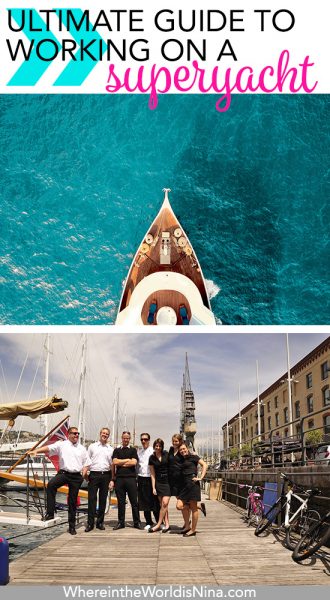
TAKE THE SHORTCUT
Want to know how to live abroad without being rich.
Get my shortcut! It's THE ONLY guide you'll need on how to sustain a life abroad—NO BS!

Nina Ragusa is an adventurer, messy bun master, breakfast fan, and full-time travel blogger. She's been abroad since 2011 and blogging on Where in the World is Nina? for nearly as long. Nina helps people like you move around the world while making money. She loves talking about how to work abroad and online to travel longer! Read more about Nina
Leave a Reply Cancel reply
Your email address will not be published. Required fields are marked *
Hi Nina, thank you so much for the information. I’m looking at doing my course (again) in November. Unfortunately I didn’t pursue the yachting industry the first time I did my course as I started working on the ships. But your insight has really motivated me to try again, so thank you.
Thank you Nina for sharing your info and guiding us, i do have a question though, i am a type one diabetic, and really want to work on a yacht, i am already currently in the Hospitality industry. Do you know whether type one diabetics are allowed to work on yachts?
Great info ! Thank you so much for sharing your experience, I’m looking forward to become a stewardess, I have a question: for working in the Mediterranean Sea it doesn’t matter which Schengen visa? I might have the chance chance to do a German visa, would that work? Thank you again J+
Thank you, Nina! I am heading to Antibes on May 1st to find my first yacht job and I am super excited! I’m always reading online and checking out any information I can in order to prepare, so this blog was a prize to find as it is loaded with fantastic info!
Hope you’re having a fantastic day, wish me luck!
Yes! The best of luck 🙂
Hi nina i have already documents f Seaman book and passport Eng1, food safety and level hygiene level 2
Stcw Sdsd My probllem is only the visa i want to earn already
Can you tell me whats lacking ,
How is the procedure in landing yachts ?
I think sometimes that when i travel my own expense in goin ‘
Like france
I think its too expensive
Or i think in mind that when i applied in us embassy here in philjppines for b1b2 visa
W/out a company yet is hard for me
Coz.i didnt travel yet in any location overseas I have first in mind that i justonly denied for that
Pls can you help me my dear ffriend Can you pls.humbly assist me in my dream career I am a greenie and recently took my iyt yacht card here in manila philippines
Its been an honor to have an indtrument /way like you
On helping othera like me
I want t hear your quick Humbly help my friend
Thank you so much Nina for all of this information! You’ve made me more excited to start my yachting career. I am heading to Phuket next month to take my STCW + Stewardess course, then am hoping to head over to Antibes after to start looking for work by March 🙂
That sounds SO exciting! Have fun 🙂
Working on Yachts & Superyachts – What You Need to Know.
Thinking about a career off-shore? Dreaming of living the high life working on a superyacht? There are a host of different paths you can take; from deckhands and watersport instructors to steward/ess’, engineers and beauticians. Whichever route you decide to take, wilsonhalligan can assist you in your job search at every stage of your career but here we’ve compiled the basics of what you need to know when first starting out.
Basic requirements for working onboard a yacht/superyacht:
A good starting point is to gain your STCW95 & ENG1 medical certificate – an essential requirement for all yacht crew. There are many courses available across the UK – a simple google search will locate your nearest course location.
Depending on the route you choose to take, onshore experience that can help enhance your CV includes: – Interior roles: Hospitality experience is essential for your CV and is experience that can be gained from a young age. – Deckhand roles: Watersports experience and general boat handling will go a long way. – Engineering roles: As well as engineering qualifications etc, alternatively, some engineers enter the yachting industry having worked in the commercial sector previously.
Where to get a yacht crew job
We would always recommend going to Antibes to kick-start the job search and build up your initial experience from the off. Being in Antibes has many advantages such as being in the area for face-to-face interviews and to obtain day work to boost your CV, experience and references.
Try to keep open minded when looking for your first position – a sailing yacht may not be what you had in mind, but you could end up loving it, and finding your career heading in a different direction to what you had thought previously! In our own experience, one job can open the door to many other opportunities and progression, so try not to be too picky about the types of jobs that are offered to you.
If you manage to get day work, this a good time to try and impress. Be punctual, helpful and enthusiastic – even if they don’t have a permanent position on board, having a good reference can do wonders for applying to other yachts.
It is possible to find work from home, however it is easier once you have that initial experience to then use a recruitment agency such as wilsonhalligan to find your next position.
Read more on this subject in our article ‘Do you have to be in a major yachting center to find a yachting job?’ https://www.wilsonhalligan.com/major-yachting-centre-find-yachting-job/ – it is possible to find work from home.
What’s it like working as yacht crew?
There’s no use in sugarcoating it, working in the industry is hard work!! You may go months without a day off, you are away from home for long periods at a time, and yes, you may have to clean a toilet with a toothpick! However, you will also have amazing experiences during this time, some say the best in their life! You will meet interesting people, make friends for life, and travel to new, exotic places.
Our tips for working as yacht crew:
Be prepared to work hard, learn fast and be a good team player – your crew will be your family whilst on board – this doesn’t mean that you have to be best friends with everyone, but show respect and remember that you are there to ensure that the guests have the best possible experience.
The wilsonhalligan team have a wealth of first-hand experience working on board yachts in a number of positions so if you would like any advice or help with your job search, please don’t hesitate to get in touch here .
Alternatively, we are now running live chats on our website every Wednesday where our team will be available to chat with you directly online. Simply visit our website on Wednesday and our live chat will pop up!
We’re here to help
Elan House, 5a Little Park Farm Road, Fareham, Hampshire PO15 5SJ

Start a Superyachting Career
Start working on a superyacht by completing the following steps:.
- Have realistic expectations
- Select a superyacht job department
- Complete superyacht training courses
- Obtain an ENG1 medical certificate
- Select a location to join the industry
- Obtain visas & documentation
- Create a superyacht CV
- Find superyacht job vacancies

1. Have Realistic Expectations

- The superyacht industry is highly competitive and in order to qualify for employment a financial investment is required (training & travel)
- For applicants without relevant experience, being physically present at or near Superyachting hubs when searching for employment is important
- Obtaining the correct qualifications does not guarantee employment and training is not refunded
- Your passport and ability to obtain Visas have an impact on your employability
- Having contacts, experience, and the correct attitude is an advantage
- Working in the industry comes with some amazing benefits but like any career path, there are also disadvantages
- Being an extremely "hard worker" is not an advantage, it is expected
- The quality of work and attention to detail needs to be of a very high standard
- You need to be well-mannered, professional, and well-suited to living in close proximity to other crew
- Presentation matters
- Getting advice from multiple sources including crew who work in the industry is advised
- Different yachts, owners, crew, and itineraries = different experiences
2. Choose the Yacht Crew Department you Wish to Work in
Before joining the yachting industry, it is essential to decide on your career path. The work environment and duties associated with each superyacht department vary greatly. It is therefore advised that you understand the training, duties and requirements associated with each role. The most common roles for crew entering the industry are:

Steward / Stewardess
A superyacht stewardess is responsible for the guest service, housekeeping and laundry. In some cases, the position is combined with an additional role for those who come from a beauty or healthcare background.

Superyacht Deckhand
A deckhand is responsible for the cleanliness and upkeep of the yacht's exterior. Wash downs, line handling, tender driving, watersports and bridge lookout duties are common tasks for deck crew.

Superyacht Chef
Working as a superyacht chef comes with some unique challenges. Although the skills are certainly transferable, there is specific training and certification required. It can be a tough but extremely rewarding job.

Superyacht Engineer
Working on a yacht or superyacht as an engineer can be a rewarding career path. Although a background in engineering or mechanics is an advantage, it is not a prerequisite. The duties associated with the role are diverse, exciting and require a great deal of hard work.
3. Complete All Mandatory Superyacht Training Courses
Having the correct training and certifications is essential to your employability in the superyacht industry. In order to become a crew member, you will need to have completed the following training:
- STCW 2010 Basic training
- Proficiency in Designated Security Awareness or Proficiency in Designated Security Duties
- Department-specific training for your desired role. (I.e. stewardess, deckhand, engineer, chef, and officer courses)
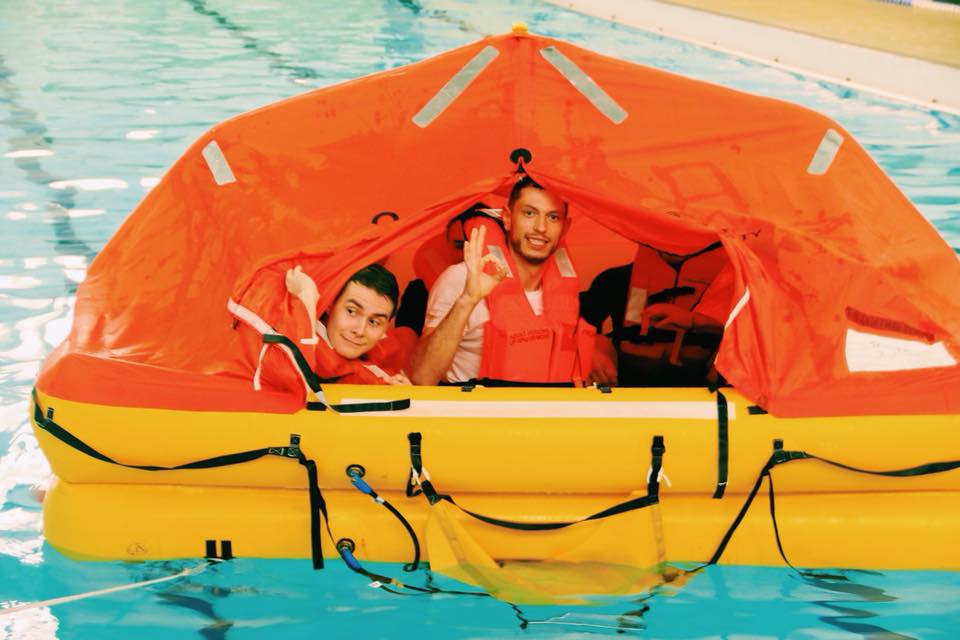
4. Obtain an ENG1 or ENG1 Equivalent Seafarer Medical Certificate

ENG1 Medical Certificate (or ENG1 Equivalent)
Superyacht work can be physically demanding. Ensuring that crew are physically well and able to work at sea is a crucial aspect of the crew and guest safety.
In order to work on a superyacht, you will have to hold an ENG1 Medical Certificate. Because the certification is set by the Maritime and Coastguard Agency (MCA), the examination must be performed by an MCA-approved doctor. The examination is done in order to identify any medical conditions that may prevent you from safely performing your work duties at sea.
5. Choose a Location to Join a Superyacht
When looking for your first job it is essential to be in the right place at the right time. There are a lot of factors to take into consideration when selecting your location, however the two most popular areas for working on a superyacht are:
6. Obtain the Correct Visas & Documentation for the Relevant Superyacht Hub
It is essential to obtain the correct visa for the country you plan to work in. It is important to understand the types of visas that exist as well as the local laws with regard to job seeking.

7. Create a Superyacht Crew CV
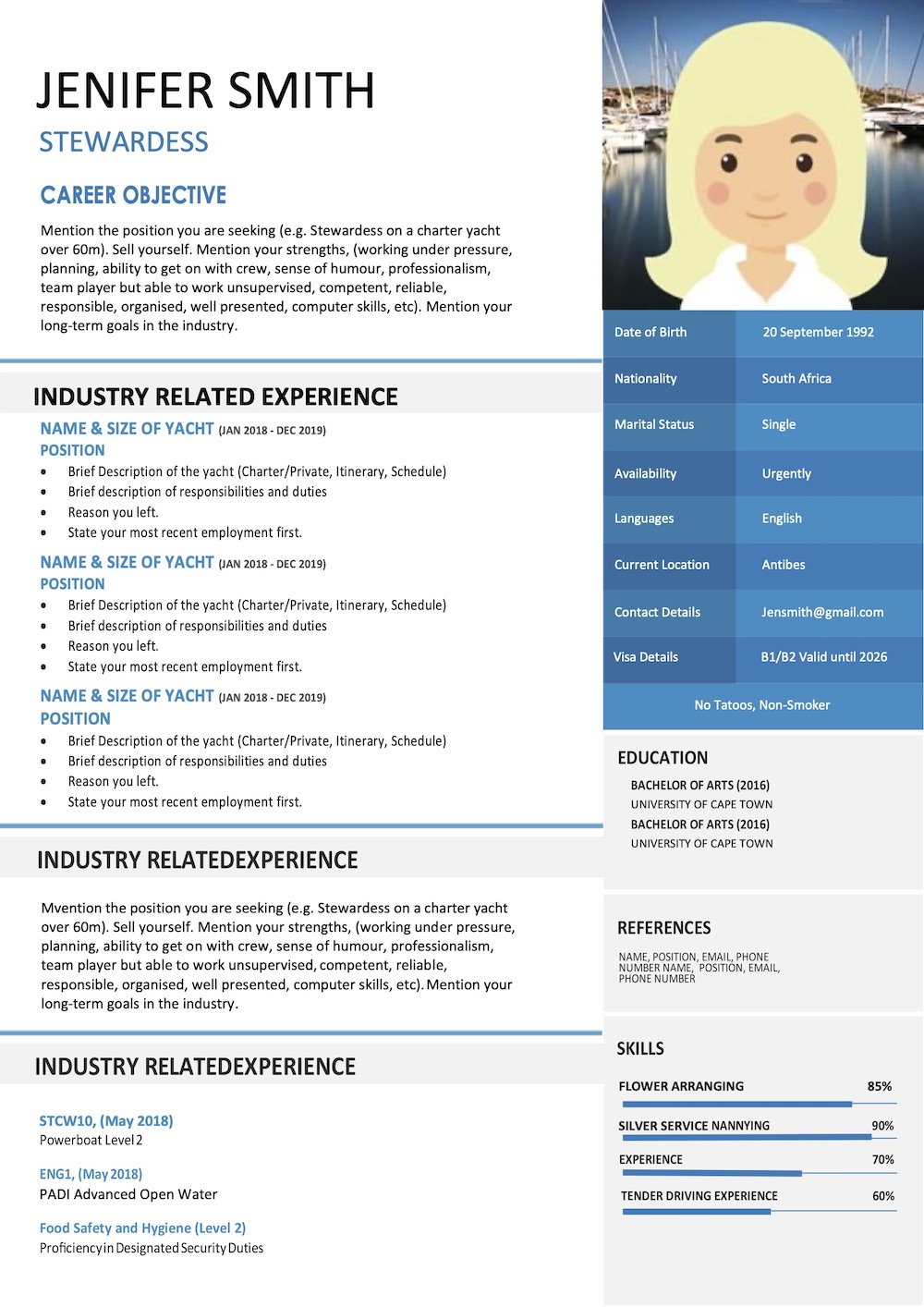
A professional and well-structured superyacht CV will help differentiate you from other job seekers looking to enter the industry.
Superyacht crew resumes have a different structure to normal CVs. If your CV is not laid out appropriately, your chances of being considered for a position are slim.
Examples and more information on how to create a great CV can be found on the links below.
8. Find Superyacht Job Vacancies
Finding the right job in the superyacht industry takes time and commitment. Using credible resources is key:
- The My Crew Kit Superyacht Job Board - Crew Agencies - Social Media Pages - Dockwalking - Networking

My Crew Kit Job Board:
My Crew Kit has the fastest-growing job board in the industry. Find the latest jobs posted by crew agents, captains and crew around the world!
View the latest vacancies
Crew Agencies
Crew Agencies play an intermediary role between yachts and crew. There are numerous agencies scattered around the main yachting hubs. Registering is a simple process and can be done online, many agencies will then request a short interview in person.
Find out more about Crew Agencies

Social Media Pages:
Online job boards and social media pages are extremely useful ways to apply for jobs as well as to find day work. It is important to only apply to jobs if you meet the criteria (have the correct experience and qualifications).
Be wary of which jobs you apply to. We recommend you only apply for jobs from closed social media groups with active moderators. Fake job posts do occur at times. Make sure you do not meet with or send personal information to suspicious accounts.
Find Appropriate Social Media Pages
Dockwalking:
Dockwalking is the process whereby you walk the docks with the aim of getting day work or even landing a permanent job. It is a gruelling task as there are often long distances between docks and it requires hours on foot. It also involves a lot of rejection as many boats are fully crewed and not looking for employees.
Find out more about dock walking.
Networking:
Your introduction to the world of yachting. The industry is growing exponentially; every year more boats are built, and more crew join the industry. It remains however, a close-knit community that feels a lot smaller than it is. ‘Everybody knows everybody’ and finding a job through a friend or a friend of a friend is often the best way to go. Crew like to work with people they get along with. They are therefore much more likely to hire someone from their extended network of friends than to look elsewhere (provided experience and qualification requirements are met).
A Few Suggestions:
- Network at every opportunity you get.
- Socialise with people you meet at training courses.
- Attend dock parties and BBQs.
- Socialise with the people in your crew house and visit other crew houses.
- Join yacht groups on social media.
- Hang out in the ‘yachty’ bars and restaurants.
- The more people you know in the industry the better off you will be.
Username or Email Address *
Remember me Lost your password?
Username or Email
Get New Password

- Connect with Us
- Like us on Facebook
- Follow us on Twitter
Yacht Crewing 101 - Getting Started!
Have you ever looked longingly at those huge luxury yachts in ports like Miami and Ft. Lauderdale in Florida and wished you could sail away to anywhere on the next one that pulls up anchor? If the answer to that question is yes, then you are already half-way to becoming a yacht crew member. Most crew members say that the Number 1 quality yacht owners and operators look for in their onboard staff members is a love for yachts and the ocean. But there's more to working on a yacht than you might think.
Here's the basic information you need to help you make a decision about whether yacht crewing is right for you.
Who Makes the Best Crew Members?
First you might be wondering if working on a yacht will work for you and your lifestyle. Here are some points to keep in mind that can answer that question.

- The pay can be great- or not. Entry level crew members typically receive the lowest pay, but you can work your way up. Captains, team leaders, and similar crew members can make between $2,000 and $4,000 per month or higher. If you're working abroad your salary may not be subject to U.S. taxes, plus you won't have rent, groceries, and other bills to pay, so the salary can go father.
- Your bosses can be demanding. If you work on a privately owned yacht, then you'll be working directly for the yacht owner. Of course yacht owners can be great to work for, or horrific - just like any other boss. It's true, however, that most yacht owners expect great service. They want the yacht to be spotless and the food great - all while being served with a smile.
- The hours can be long. While you are cruising you can find yourself working from 6:00 AM to midnight in order to meet your passengers' needs. Sometimes you may not have much of a break throughout the day.
- The work can be never-ending, and requires physical labor. You need to be physically fit and prepared to work on your feet for long periods of time. You may have to scrub toilets, as well as the exterior of the yacht. It's not glamorous work, even though some of the benefits can be.
If after learning that the work can be sporadic, often low paying, and involves a lot of physical labor and long hours you still like the idea of working on a yacht, then yacht crewing is definitely right for you. And you won't be alone. What crew members love most about yachting is the ability to travel to some of the world's most beautiful locations, the camaraderie of working as part of a team, and the joy of being out on the open ocean. They find that the positives far outweigh the negatives.
Don't be stuck with a boring job! Search for your Dream Job Today!
Life Onboard a Yacht
So you already know that you'll work long hours and perform mostly physical labor. But there's still a lot more you want to know about what it's like to work on a yacht. First, it's likely you will share a cabin with another crew member. The good news is that on most yachts, while your cabin may be small, it is usually in good condition and better than the average motel room. Your food should be good, too.
Most of the time you will get some time off to enjoy the fabulous locations you're visiting. You can also get to know people from all over the world.
There are some rules you should keep in mind as well. Here are some of the most common rules you'll encounter as a yacht crew member.
- Drugs and alcohol are not permitted onboard. When you are off duty and no passengers are on the yacht you may be able to indulge in an alcoholic beverage or two, but that depends on the yacht and its owner.
- No smoking onboard.
- No guns or weapons are allowed onboard.
- You must know and follow all safety regulations.
- You must be clean and well groomed, and have a service-oriented attitude.
- What happens onboard stays onboard. Your guests' and/or owners' privacy is paramount.
- Go above and beyond the call of duty. Not only does this keep you working, but it gives you higher tips as well.
There are many more details about working as a yacht crew member. That's why you'll find many articles on this site that will give you more in-depth information on subjects such as the different kinds of yachts, how to get a job, where to find a job, job descriptions, training, and much more. It's all the information you need to find that ideal job as a yacht crew member, so your dream of sailing away can come true.
- Search Thousands of Jobs
- Cruise Industry Career Tips and Proven Strategies to Get Hired!
- Create a Personal Profile
- Use our Advanced Job Search
- Accounting - Finance (233)
- Activities - Fitness (51)
- Administration - Clerical (54)
- Administration - Management (8)
- Advertising - Marketing - PR (121)
- Casino (13)
- Cruise Line - General (651)
- Culinary - Chef - Cook (1,118)
- Deck & Engine (8)
- Engineering (397)
- Entertainment (22)
- Food & Beverage - Restaurant (536)
- Front Desk - Concierge (1)
- Guest Services (147)
- Housekeeping (29)
- HR - Payroll - Training (115)
- IT - Internet (20)
- Landscaping - Grounds (6)
- Mechanic - Maintenance (341)
- Other (243)
- Procurement - Purchasing (28)
- Resort - General (274)
- Retail - Merchandising (24)
- Sales - Reservations (34)
- Salon - Spa (257)
- Security - Surveillance (81)
- Shore Excursion (2)
- Travel - Tourism (23)

- EXPLORE Random Article
How to Work on a Yacht
Last Updated: June 4, 2023 References
This article was co-authored by wikiHow Staff . Our trained team of editors and researchers validate articles for accuracy and comprehensiveness. wikiHow's Content Management Team carefully monitors the work from our editorial staff to ensure that each article is backed by trusted research and meets our high quality standards. There are 8 references cited in this article, which can be found at the bottom of the page. This article has been viewed 3,257 times.
Working on a yacht is a unique, fun, and potentially lucrative way to earn a living. While it can be intimidating and challenging to get a job on a yacht, having the opportunity to work while traveling can make it well worth it. To begin working on a yacht, you can get an entry-level job that requires little to no prior yachting experience. Once you are more experienced in the yacht business, you will be able to work on a yacht in a more advanced and specialized role.
Getting an Entry-Level Job on a Yacht

- Junior deckhands generally have a good work ethic, positive attitude, ability to learn on the job and follow directions, a professional appearance, and work well with a team. [2] X Research source
- Junior deckhands are responsible for cleaning, polishing, and waxing the yacht, assisting the bosun and first mate with maintenance, and helping with general yacht operations, including line handling, navigation, passenger safety, and water sports. [3] X Research source
- Junior deckhands make approximately $27,000 per year. [4] X Research source

- While not always a requirement, having a watersports certification, fishing knowledge or expertise, and/or carpentry skills can help you get a job as a deckhand on a yacht. Having one or more of these skills may also help you earn more money. [7] X Research source
- Much of a deckhand’s work is performed on the outside of the boat. Therefore, as a deckhand, you would be doing a lot of manual labor outside. This can be helpful to keep in mind when deciding if working as a deckhand is right for you.
- Deckhands usually make between $27,000 and $55,000 per year.

- Boat attendants are responsible for maintaining the cleanliness of the ship’s interior, helping with guest management and entertainment, and assisting the crew in maintaining the safety of everyone on board. [9] X Research source
- Successful boat attendants are high-energy and good entertainers, exhibit proper hospitality etiquette while on the job, and are committed to maintaining yacht cleanliness. [10] X Research source
- Entry-level ship attendants usually make around $40,000 per year, while more experienced workers can make up to $100,000 per year on a large luxury yacht. [11] X Research source

- One of the keys to working as a chef on board a yacht is the ability to get creative with your ingredients. Once you leave the dock, you will likely only have access to the ingredients that you have on hand.
- When considering working as a chef on a yacht, it can be helpful to take into consideration the size of the yacht, the number of people typically on board, and the conditions in the kitchen. As the chef, you will be responsible for making most (if not all) the food for everyone on board, meaning that you may be spending most of your time in the kitchen.
- If you have experience or professional training as a chef, you can make between $52,000 and $100,000 per year on a yacht, depending on your level of training and the size of the yacht. If you do not have any prior experience, you can make between $36,000 and $75,000 per year as a chef on a yacht. [12] X Research source

- Crewnetwork.com and luxyachts.com are both popular yacht crew online agencies.

- If you are working on a yacht abroad, you may need to acquire a work visa. Contact your yachting company or owner to see if this applies.
Working in an Advanced Position

- Bosuns often have a specific area of expertise that helps them land the job and makes them a more valuable member of the crew, such as advanced woodworking, varnishing, rigging, or watersport expertise.
- Bosuns generally make between $36,000 and $100,000 per year.

- On smaller yachts, there is usually just one mate, called the first mate. On larger yachts, however, there may also be a second mate and, possibly, even a third mate. The second and third mates also have extensive experience, yet generally a bit less than the first mate.
- In the event of an emergency, or if the captain needs to take a leave, the mate is responsible for taking over the captain’s duties. As a result, mates need to have any required licenses or certifications for their specific type of yacht.
- Mates on a yacht typically make at least $48,000 and up to $100,000 per year. [14] X Research source

- Yacht captains must have a high school diploma or GED.
- To be a yacht captain, you will need to take a captain’s license course and pass the licensing exam.
- The captain of a yacht typically makes a minimum of $65,000 per year. Captains can make well over $200,000 per year working on a larger yacht. [16] X Research source

- Most engineering positions are available on larger yachts called superyachts. While smaller yachts will hire a yachting engineer for maintenance, they do not usually have a permanent engineer that works on-board. [18] X Research source
Expert Q&A
- Larger luxury yachts may also hire beauticians, pursers, and/or managers to provide luxury services to their clientele. [19] X Research source Thanks Helpful 0 Not Helpful 0
- You can find job postings for positions on yachts on general job search engines, such as Indeed and ZipRecruiter, as well as specialized yachting job search engines, such as yotspot.com and yaCrew.com. Thanks Helpful 0 Not Helpful 0
- When looking for a job on a yacht, it can be helpful for you to already have completed your Standards of Training, Certification, and Watchkeeping (STCW) certification course. This certification is not always required to work on a yacht, but it can help make you a more desirable candidate. Thanks Helpful 0 Not Helpful 0
You Might Also Like

- ↑ https://www.luxyachts.com/crewpositions/jrdeckhand
- ↑ https://www.luxyachts.com/crewpositions/deckhand
- ↑ http://www.workonayacht.com/index.php/official-yacht-stewardess-job-descriptions-salaries/
- ↑ https://www.crewfinders.com/yachtcrewsalaries.shtml
- ↑ https://www.luxyachts.com/crewpositions/mate
- ↑ https://www.luxyachts.com/crewpositions/captain
- ↑ https://www.crewnetwork.com/Yachting-Jobs/engineer.aspx
- ↑ https://whereintheworldisnina.com/working-on-superyachts/
About this article

Did this article help you?

- About wikiHow
- Terms of Use
- Privacy Policy
- Do Not Sell or Share My Info
- Not Selling Info

- Career Advice
- Salary Guide
- Dockwalk Presents
- Digital Dockwalk
How to Get a Job as a Yacht Stewardess

Kate got her start in the yachting industry working as crew. She spent five years cruising the Bahamas, Caribbean, New England, and Central America, then segued that experience into a career in marine journalism, including stints as editor of Dockwalk and ShowBoats International .
If you’re not afraid of hard work, have a knack for hospitality and service, and are a team player, then traveling the globe as superyacht stewardess could be in your future. Here is everything you need to know to land a job as a stewardess on a luxury yacht...
A yacht stewardess (or steward) is an entry-level position in yachting that provides a gateway to a career in hospitality at sea. A stewardess serves a vital role as part of the interior team and is responsible for the upkeep and presentation of the interior of a vessel.
One of the greatest appeals of working as interior crew on a superyacht (other than travel and tips ) is that the role of a stewardess doesn’t require extensive schooling or qualifications. While experience in the hospitality or customer service sector is advantageous, when starting out as a junior steward or stewardess, it is more about having a friendly disposition and being willing to learn and work hard.
“The ideal junior stewardess will have an eagerness to absorb information and learn the ropes properly, the ability to take direction and follow instructions, as well as the confidence to ask questions when clarification or additional instruction is needed,” says Sarah Bester with Northrop & Johnson Crew Services .
What is a Yacht Stewardess?
A steward or stewardess maintains the interior of a superyacht and provides five-star service to its owners and guests. On charter or owner trips, the interior team handles beverage and meal service, housekeeping, and laundry, all with the highest attention to detail. They have the most face time with guests so are responsible for relaying their wishes to the deck department, chef, and captain.
What Does a Yacht Stewardess do?
A junior member of an interior team on a yacht larger than 45 to 50 meters will typically start his or her career in the laundry room and/or in housekeeping rather than in service.
On smaller boats, the stewardess can be a department of one. “If you’re a solo stew you’ll be up early doing it all,” says Alene Keenan, a 30-year veteran of interior work who has literally written the book on yacht service, The Yacht Guru’s Bible. The day starts with opening duties: “setting up for breakfast, preparing breakfast, serving and clearing breakfast, laundry, cabin service, housekeeping duties, more laundry,” lists Keenan. This is followed by lunch service and more housekeeping and laundry, ongoing beverage service, setting up for afternoon activities, cocktails and hors d’oeuvres service, dinner service, cabin turndowns, finishing and returning laundry, and to close the day, pulling dishes, décor, and service items for the next day’s breakfast.
“If you have two or more interior crew, the duties are shared and probably rotated, and start times depend on hours of work and rest,” Keenan says.
- Top Tips For Working as a Stewardess
On larger yachts, the chief stew will provide his or her team with a checklist of duties to perform for each shift. “The routine will generally be the same,” says Chief Stewardess Tracey Bamforth . “You will be allocated a shift, shift duties, and shift expectations. You will wake up and dress in your on-charter uniform, making sure you are presentable, fresh, and on time. It’s important to remember that when the guests are on, your need to manage yourself to the best of your ability: speaking softly, working smartly, being very aware of your environment — for example, not leaving cleaning products out and about and keeping the yacht to its absolute best standard.”
Off-charter is when maintenance, deep cleaning, and inventorying are done in addition to daily laundry, crew mess, and bridge duties.
Who Does a Yacht Stewardess Report to?
This varies depending on the size of the yacht and crew. “Every yacht is unique and could have a different set-up; nothing is black or white,” says Lien Eggermont, senior yacht placement consultant for interior crew at Viking Crew .
Generally, when a stewardess works alone, they report to the captain. When there are two or more in the interior department, the junior would report to the chief stewardess, or with larger teams, they may even report to the second steward/ess. For the largest of superyachts, each interior division — housekeeping, laundry and service — will have their own head of department (HOD), so for example a housekeeping stewardess would report to the head of housekeeping.

What Qualifications Do I Need to Become a Yacht Stewardess?
All crew need STCW basic safety training , a five-day course, and an ENG1 medical certificate , and some yachts may also require certification in Food Safety & Hygiene, a one-day course.
On top of these necessities, there are numerous options for yacht-specific interior training, but many chief stews, like Robert, prefer to teach on the job. “Most of the skills you need in yachting, especially in the interior, you learn as you go,” she says.
The amount of knowledge you need going in may depend on when you’re hired. “Early in the season, the HOD will have time to train and teach everything from scratch. Mid-season they don’t have time to hold somebody’s hand — in the nicest possible way — and will need somebody who can hit the ground running,” Eggermont says.
Courses that introduce entry-level candidates to yacht interior work are offered in many countries around the world. “Bluewater hosts some fantastic courses; their Yacht Interior Service courses start at a zero-to-hero course and can really help with a newbie or green stewardess who wants to acclimate and understand the principles and products used on a vessel,” Bamforth says.
Bester points out that additional courses like silver service and WSET (Wine & Spirit Education Trust) can help a candidate stand out. “These courses are an additional investment and thus an indication that the candidate may be more career minded,” she says.
- Recommendations for Entry-Level Interior Crew
“Training has always been a privilege in my mind,” adds Bamforth. “Most newbies starting out will already be stretched from arriving from a new country, trying to find a new role, living in a crew house, and then to expect them to start off with a couple thousand dollars in courses under their belts is somewhat unfair. I believe in the ability to train and trial a newbie and give them the opportunity to show you they have the capacity to work, learn, live in a very close environment with others, repeat the systems they are learning, and, most importantly, have a good attitude!”
Maxine Robert, chief stewardess on 47-meter M/Y Loon , adds, “Having a positive attitude is everything as we live in such close quarters and work very closely with each other every day.”
What Experience Do I Need?
“Many programs will consider junior stew candidates who are green to yachting but come with strong land-based hospitality experience,” says Bester. Eggermont seconds this: “Waitressing in high-end restaurants or hotels, background in events, housekeeper in a hotel or, for example, a boutique B&B. But also candidates who have worked on board cruise ships or river cruises will be considered.”
Keenan points out a wide range of work experiences on land that translate to interior work at sea, listing: “restaurant/hotel work, flower arranging , event planning, retail sales, anything with customer service.”
Furthermore, Bamforth says she considers a potential new hire’s complete background, including things like whether they have finished university — “my thoughts would be that they have a ‘stick it out to the end’ attitude, and an ability to think on their own, which is always a plus,” — or if they played team sports at school — “shows an aptitude for playing nicely with people.” She says she has enjoyed working with hires from a wide variety of backgrounds, from advertising to having a family member who is a florist. “Nurses or medical-trained candidates I find to be extremely empathic and good with other crewmembers,” she says.
How Much Does a Yacht Stewardess Earn?
The entry-level starting salary can range from $2,500 to $3,500 per month, says Bester at Northrop & Johnson. “Charter programs will typically be on the lower end of the salary range due to the additional income crew receive through charter tips,” she says. Eggermont at Viking Crew says the average is €2,500 per month.
Dockwalk conducts an annual salary survey that polls both placement agencies and working yacht crew. According to its most recent 2020 Salary Survey , the low end of the range given by agencies — where most junior crew would start — is between $2,250 and $2,800 per month. Interior crew who aren’t working as the chief or solo self-reported that they made from $3,000 to $4,500 per month, with the bigger bucks being netted on bigger vessels.
The earning potential of interior crew grows alongside experience. At the top of their game, a chief steward/ess on a vessel longer than 70 meters earns $7,000 to $12,000 per month, says Dockwalk ’s wage guide.
“I’d say don’t be too picky as a junior crewmember,” Eggermont says. “If a 90-meter-plus (yacht) offers you a role at €2,000 with potentially an increase after probation or so, I’d say take it. Do a season, do your best so that you get a great reference. You need a foot in the door!”
Related articles:
- What are the Different Crew Roles on a Luxury Yacht?
- How to Get a Job as a Yacht Chef
- Everything You Need to Know About STCW Training
- What is the ENG1 Medical Certificate and Why Do I Need it?
All guides , Deckhand , Stewardess , Yacht Jobs
How to become a yachtie.
- November 1, 2023
“Ahoy there, future yachties! Are you ready to embark on an exciting and luxurious career on the high seas?” If the idea of working on a yacht, traveling to exotic locations, and catering to the needs of the rich and famous sounds like a dream come true, then you’re in the right place. In this comprehensive guide, we’ll explore the ins and outs of the yachting industry, from the essential skills and certifications needed to make a splash, to tips on building a strong resume and making valuable connections in the yachting world. We’ll also discuss the various career paths available, from starting out as a deckhand to eventually taking the helm as a captain. Finally, we’ll delve into the yachtie lifestyle, and how to strike the perfect balance between work and play while living and working on the world’s most luxurious vessels. So grab your deck shoes and let’s set sail on this exciting journey to becoming a yachtie!

1. Discovering the Yachting Industry: Opportunities and Requirements
The yachting industry offers a wide range of career opportunities for those who are passionate about the sea and luxury vessels. From deckhands and engineers to chefs and stewardesses, there is a position for every skill set and interest. To begin your journey in this exciting field, it is essential to understand the requirements and qualifications needed for each role. This will help you determine which path is best suited for your skills and aspirations.
Before diving into the world of yachting, it is crucial to familiarize yourself with the certifications and training necessary for your desired position. For example, aspiring deckhands should obtain their STCW (Standards of Training, Certification, and Watchkeeping) certification, while engineers may need to complete an MCA (Maritime and Coastguard Agency) approved course. Additionally, it is essential to have a valid passport, a seafarer’s medical certificate, and potentially a visa, depending on the country you plan to work in.
Once you have acquired the necessary qualifications, it is time to start networking and job hunting . Many yachties find their first job through word-of-mouth or by connecting with others in the industry. Attending boat shows, yachting events, and joining online forums can help you make valuable connections and learn about job openings. Furthermore, registering with a reputable yacht crew agency can increase your chances of finding the perfect position. Remember to create a professional CV and be prepared for interviews, as competition in the yachting industry can be fierce.
2. Essential Skills and Certifications for Aspiring Yachties
Entering the world of yachting requires a unique set of skills and qualifications, which are essential for ensuring a successful career. Obtaining the necessary certifications is a crucial step in becoming a yachtie, as these credentials demonstrate your competence and commitment to the industry. Some of the most important certifications include the STCW (Standards of Training, Certification, and Watchkeeping) Basic Safety Training, which covers essential safety and survival skills, and the ENG1 Medical Certificate, which confirms your fitness to work at sea.
Aside from certifications, aspiring yachties should also focus on developing their soft skills and practical abilities . Excellent communication, teamwork, and problem-solving skills are highly valued in the yachting industry, as crew members must work closely together to ensure smooth operations and guest satisfaction. Additionally, proficiency in various tasks such as cooking, cleaning, and maintenance is crucial, as yachties are often expected to perform a wide range of duties on board. By honing these skills and obtaining the necessary certifications, you will be well on your way to a rewarding career as a yachtie.
3. Building a Strong Resume: Tips for Landing Your First Yacht Job
As a newcomer to the yachting industry, it’s essential to create a compelling resume that showcases your skills, experience, and passion for the job. Start by highlighting any relevant experience you may have, such as working in hospitality, customer service, or a related field. If you have any certifications or licenses, be sure to include them as well. When crafting your resume, consider the following tips:
- Keep it concise: Aim for a one-page resume that’s easy to read and understand.
- Use a professional format: Choose a clean, modern design that highlights your most relevant information.
- Include a personal statement: Write a brief introduction that explains your interest in the yachting industry and what makes you a great candidate for the job.
Networking is a crucial aspect of landing your first yacht job, so attend industry events and connect with professionals in the field. This can help you learn about job opportunities, gain valuable insights, and make a lasting impression on potential employers. Additionally, consider joining online forums and social media groups dedicated to yachting to expand your network and stay informed about the latest industry news.
Finally, be persistent and proactive in your job search. Apply to multiple positions, even if they’re not your ideal role, as this can help you gain experience and make connections within the industry. Don’t be discouraged by rejection – it’s a natural part of the job search process. Instead, use it as an opportunity to learn and improve your resume and interview skills. With determination and a strong resume, you’ll be well on your way to becoming a successful yachtie.
4. Networking in the Yachting World: Making Connections that Matter
Establishing a strong network is crucial for success in the yachting industry. Building relationships with fellow yachties, captains, and industry professionals can open doors to new opportunities and help you advance in your career. Attend industry events, such as boat shows and yacht crew meetups, to meet like-minded individuals and expand your network. Don’t be afraid to introduce yourself and engage in conversations, as this can lead to valuable connections and potential job offers.
Utilizing social media platforms is another effective way to network in the yachting world. Join Facebook groups, follow industry influencers on Instagram, and connect with professionals on LinkedIn to stay informed about the latest news and job openings. Be active in these online communities by sharing your experiences, asking questions, and offering advice. This will not only help you learn from others but also showcase your expertise and passion for the industry.
Finally, consider creating a checklist to track your networking efforts and ensure you’re making the most of every opportunity. This can include goals such as attending a certain number of events per month, connecting with a specific number of professionals online, or following up with contacts you’ve made. By setting measurable objectives and regularly reviewing your progress, you’ll be well on your way to building a powerful network in the yachting world.
5. Climbing the Yachtie Career Ladder: From Deckhand to Captain
Embarking on a career in the yachting industry can be both rewarding and challenging. One of the key aspects to success is understanding the various roles on a yacht and how to progress from one position to another. Starting as a deckhand , you will gain valuable experience and skills that will serve as the foundation for your future growth in the industry. As you continue to learn and develop your abilities, you will have the opportunity to advance to higher positions, such as mate, engineer, or even captain.
One of the most important factors in climbing the yachtie career ladder is gaining relevant qualifications and certifications . For example, obtaining your STCW (Standards of Training, Certification, and Watchkeeping) certificate is essential for working on any yacht. Additionally, pursuing specialized training in areas such as navigation, engineering, or hospitality can significantly increase your chances of securing a higher position on a yacht. It is also crucial to network within the industry, as many job opportunities are found through personal connections and recommendations.
Lastly, developing a strong work ethic and demonstrating professionalism at all times will set you apart from other crew members. This includes being punctual, maintaining a positive attitude, and taking pride in your work. As you continue to excel in your role and gain the trust of your captain and fellow crew members, you will be well on your way to climbing the yachtie career ladder and achieving your ultimate goal of becoming a captain.
6. Living the Yachtie Lifestyle: Balancing Work and Play on the High Seas
Embracing the yachtie lifestyle requires a delicate balance between hard work and enjoying the perks of the job. While the days can be long and demanding, the rewards are often worth the effort. To maintain this equilibrium, it’s essential to develop a routine that allows you to excel in your duties while still finding time for relaxation and personal growth. A checklist can be a helpful tool to ensure you’re staying on track with your responsibilities and making the most of your downtime.
One of the key aspects of living the yachtie lifestyle is learning how to adapt to the unique challenges of working on a yacht. This includes mastering the art of multitasking, being prepared for unexpected situations, and maintaining a positive attitude even when the going gets tough. By staying organized and focused, you’ll be able to enjoy the incredible experiences that come with working on a luxury yacht, such as exploring exotic destinations, meeting new people, and indulging in world-class cuisine. Remember, the key to success in this industry is finding the right balance between work and play, so make sure to take advantage of the opportunities that come your way.
Frequently Asked Questions
1. what are the different roles available on a yacht, 2. how long does it take to become a qualified yachtie, 3. can i work on a yacht without prior experience in the industry, 4. what is the salary range for yacht crew members, 5. what are the typical working hours and conditions for yacht crew members.

Yacht Deckhand Premium STCW

Yacht Stewardess Premium STCW

Yacht Stewardess Full STCW

Superyacht Deckhand Full STCW

Top 10 best places to find a Yacht job in the Med 2024?

Yacht Job Australia: A Guide to Get a Yacht Job

STCW Training Australia Guide
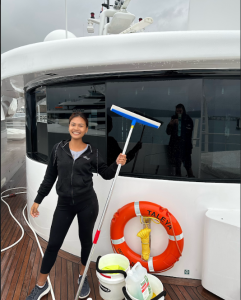
How to Become a Yacht Deckhand Australia

Yacht Stewardess Job Germany

How to Become a Yacht Stewardess in Australia?

Where can I find a Yacht job ?
Superyacht crew training europe.

Next 2 bookings get 50€ free when applying code: yachtie50
Get free yacht cv and yacht job offers

- Charter & Brokerage
- Yacht Design & New Builds
- Tenders & Toys
- Superyacht Events Calendar
- Career & Training
- Departments
- Superyacht Crew Finances
- Sustainability
- Shipyards and Marinas
- Health & Wellbeing
- Polar Region
- Our Services
- Meet the Team
Working an a Yacht & the Things I Wish I’d Known as a Stew
.png)
How many times have you thought: If only I had known ?
Jamila Garcia, founder of Starfish Crew is here to tell us what she wishes she knew before working on a yacht, with a simple career tip-based guide. She reminds us that even those who are happy with the path they have followed and have no regrets can still reflect on the past. There are always things that we think we should have done differently if we could go back in time.
So, what did yacht stew Jamila wish she’d have known?
Career tip 1-training:.
“If I was 18 again, and had to decide what I was going to do with my life, I would still complete professional butler training. That is the one thing that I have always known I wanted to do. However, I wouldn’t spend 6 years at Uni for that. After completing my training, I would look for a job at a luxury hotel, or private residence. I would work for a year, to achieve the experience I consider basic to work on a superyacht, even as a Junior. Then I would look for my first yachting job, because by that point, (unlike it happened “in real life”) I would know that the yachting industry exists and you can earn a lot of money working on a superyacht! So… I totally knew what my passion was long before yachting: high-end service. But, if that’s not the case with you, I wouldn’t recommend you to go spend thousands of euros on service (let alone housekeeping) courses. I have had many Stewardesses over the years with 0 to very little service experience, and they turned out to be amazing Stewardesses (most of them Chief Stews nowadays)”.
Figure out what you enjoy and start from there
- Find a job first
- See what the reality is when working on a superyacht
- Decide what aspects of it you really like
- Focus on that route
Let’s say that, before working on a superyacht, you didn’t have a clue that you were going to be passionate about wine.
- You love inventorying all those fantastic bottles onboard
- Decanting it
- Advising your guests on the correct wine for each menu…
Invest your hard-earned money on wine courses. Even become a Sommelier! It would be a privilege to have a qualified Sommelier on board and it would certainly be appreciated in the industry.
Let’s say you find yourself loving flower arranging:
Invest in flower artistry courses!
Let’s say you dream of becoming a Purser:
Invest in a professional Purser course!
This career tip is especially important as it will allow you to learn more about yourself and unlock your skills!
CAREER TIP 2-SIZE OF THE VESSEL:
“However, I did get one thing right: the size of the vessels I wanted to work on. At the beginning of my career working on a yacht, I was lucky. My first yacht was a 56-meter motor yacht. Because it was an explorer yacht, the interior was quite large for a vessel that size. I instantly felt comfortable on board. So that’s the size I have continued working on. The largest yacht I have worked on is 62 meters, with 17 crew. That was more than enough for me. I have never wanted to work on a larger vessel, even when I have been offered amazing positions on large yachts. I just know that I feel much more comfortable with a certain amount of crew around me. Amongst other factors”.
This is to say that no one knows you better than yourself.
- If you don’t feel comfortable working on a 100-meter vessel, or a 30-meter vessel, remember that when you are looking for your next position.
- Don’t just accept another position on the same size vessel you have just resigned from if a big part of the reason for your resignation was the size.
CAREER TIP 3-LONGEVITY:
“I stayed on my first yacht for 18 months. 18 Outstanding months. I did more nautical miles during those 18 months than during the eight next years. However, this was a private yacht where I basically did the-same-exact-thing every-single-day. Guests on and guests off. Because the yacht’s route wasn’t your typical “yachtie spots” I did not have contact with any other yachties other than my co-workers. I literally did not have a clue about the existence of charter yachts. Had I known I would have probably left my first yacht sooner. Not much sooner though, I would have done one year. Longevity, and all that, right?”
So, it is helpful to think about how long you should stay on your yacht and when to move on to the next
- Stay on every boat you work on for at least a year.
- Then, do whatever you feel you need to do with your career after your year onboard. Especially when you are just starting.
CAREER TIP 4-WORKING ON A PRIVATE YACHT OR CHARTER:
‘I personally would much rather work on a charter yacht. Not only because of the money. I just get too bored on a private yacht. I like to be the one deciding what I do with the table settings, theme parties, where to serve what etc. Owners telling me to serve red wine in the water goblet, and stuff like that… I just can’t deal. However, this is just me. You might feel much more comfortable knowing your guests, doing the same thing etc… That’s perfectly fine. Also, let me tell you something. Starting your yachting career on a “heavy charter” yacht might blow your mind (in a bad way). I was working on a yacht with a heavy charter where two of the junior stews were 100% green and that was their first, and last, season. Charter yachts are pretty hardcore. So remember this if you get offered your first position on a heavy charter yacht’.
You need to be able to know if you have a preference as to which yachts you would like to work on
- Try both when first starting out
- Then, decide what fits YOU better
‘I did not know that the yachting industry existed. Therefore, I couldn’t have sought out any advice or guidance on how to get into it from anyone. However, if I had to start again, the first thing I would do is look for a place to get all of this advice’.
Invest in getting the RIGHT information from the RIGHT people
- Find out the right steps to take to land your first position EXACTLY
- Connect with yachting industry professionals that could help you find a position
- Invest in: Getting a professional CV done, finding out what you are going to be asked during interviews, and, what your role will entail.
Two places which offer this advice is firstly www.starfishcrew.com
Download the free basic guide to working on superyachts here .
And, Crew Library also has many free resources and services.

We hope this article provided you with an insight into the life of a stew working on a yacht.
For more of the latest industry content, click here .
If you looking for your first position working on a yacht or maybe you are a seasoned yachtie looking for your next adventure. Head over to our jobs board to see our available positions.
Jamila Garcia
Related articles, the crew network – top jobs this week, crew, got something to say we want to hear from you, know your ship how to fire a rocket parachute flare, safely, refreshing springtime cocktails for superyachts.

Popular Posts
- MB92 launches sustainability plan
- Captain Luke Hammond launches a solution to yacht recruitment to help all
- H2 Have A Sleek New Concept To Show Us
- Visiting Monaco at the speed of a F1 car
- 6 Simple Superyacht Cocktail Recipes
Superyacht Content
Social media influencer and digital brand expert.
Superyacht Content brings you the latest in social news for the superyacht industry.
Keep up to date with us across our social channels, and don’t forget to hit that share button!
- Superyacht News
- Superyacht Jobs
- Superyacht Marketing
Join our Newsletter
- Your Name First Last
- Your Email *
Copyright © 2023 Superyacht Content | Website Design by Zonkey
Privacy | Credits | Get in Touch
Yacht Crew Job Board
With Bluewater's expertise in crew training and yacht crew recruitment, finding your ideal yacht crew vacancy is simple. We offer yacht management services to a variety of exclusive superyachts. Our team excels in sourcing top-notch yacht crew positions, spanning from 25-meter private yachts in the Bahamas to 50-metre charter yachts in the Mediterranean to luxurious 100+ metre superyachts navigating the globe extensively.
103 yacht crew jobs available now.
Yacht Crew Training
Alongside sourcing the latest yacht crew jobs worldwide, Bluewater offers a range of specialised yacht crew training courses. Whether you're new to the superyacht industry seeking entry-level qualifications, an experienced deckhand or engineer aiming to advance your career, or a dedicated crew member looking to enhance your resume with certifications like HELM (Human Element Leadership and Management), Yachtmaster, or OOW (Officer of the Watch), explore our comprehensive yacht crew training options.
Working on a Luxury Yacht
Working as a crew member on a superyacht is undeniably one of the most rewarding yet demanding professions, calling for hard work, dedication, and professional training. The opportunities within the yachting industry are vast, and at Bluewater, we are committed to helping every crew member discover their ideal yacht crew position. Our recruitment division focuses on finding the perfect yacht for crew members and provides unparalleled professional support. Our recruitment experts guide crew members through every step of their yachting career journey, ensuring they receive the best possible assistance.
Manage Your Yacht Career
Whether you're seeking a yacht crew position as a deckhand, engineer, onboard masseuse, stewardess, chef, chief stewardess, purser, first officer, or captain, take control of your yacht career. Create a profile and join one of the world's largest yachting communities for free.
103 JOBS FOUND
- permanent 5:1
- Qualifications: STCW, ENG1,PDSD,FH2
- Experience: -
- Salary: 2500

- Seasonal (9 Months)
- Qualifications: Yachtmaster Offshore (MCA)
- Experience: 3 Years +
- Salary: 3500EUR
- Qualifications: STCW, ENG1, Food & Hygiene Level 2
- Experience: Fine dining or Michelin restaurant experience
- Salary: 4500 to 5000EUR (DOE)
- Qualifications: STCW, ENG1, PBL2
- Experience: 1 Year +
- Salary: DOE
- Experience: 1 to 2 Seasons
- Experience: 2 to 5 Years +
- Qualifications: STCW, ENG1, OOW
- Experience: 5 Years +
- Salary: 7000EUR
- Rotation 2:1
- Qualifications: STCW, ENG1, Food & Hygiene Level 2, PDSD, Crowd Management Certificate, Spa Therapy, Massage & Beauty Qualifications
- Experience: 1 year
- Qualifications: STCW, ENG1
- Experience: 5 years+
- Salary: Industry standard, TBD

Get Onboard
Superyacht Training

The Truth about Working on Superyachts
Working on a superyacht has much to offer. Amidst the beautiful setting and interesting guests, lies plenty of adventure and excitement! It is important, however, to be aware of a few realities that will help you mentally and physically prepare for the journey.
You need some form of qualification
To get a job on a yacht, you need more than waitressing experience and a lovely personality. You require job-specific qualifications. The bare minimum would be the STCW 2010 course, which is compulsory for all crew members to have completed. The course covers the basics of safety and security at sea and runs over 11 days. If you’re a little more experienced, or once you’ve completed your STCW, you may consider growing your list of qualifications by taking the Deckhand Course . This is ideal if you are interested in more physical work. You will be taught practical skills like rope work, winching, wash downs, anchoring and more.If you prefer working with guests, food and drink, then the Interior Crew Training Course would be better suited.
It’s not all about your looks
The yachting industry can be very superficial, but that doesn’t mean you won’t spend your days cleaning toilets and polishing. Charter guests and yacht owners are some of the wealthiest and most influential people in the world and are used to a standard of luxury and a certain level of service. While a smart appearance is required, if you are not willing to work hard and get your hands dirty, then no matter how beautiful you are, this industry may not be for you.
Seasickness
It’s real and it can be ugly. It can affect just about anyone, so don’t be disheartened if you suffer from it; it doesn’t mean that the industry isn’t for you. As you get familiar with life at sea, you will figure out ways of preventing illness as best as possible. Two suggestions we have are to avoid alcohol the night before a long passage and to keep some motion sickness tablets on you at all times – these are magic!
Cabin sizes
Don’t be fooled into thinking that working on a bigger boat means bigger crew quarters. Get used to sleeping on a bunk bed and sharing a room the size of an average dining room table with your friend – OK, it might not be that bad… or is it?
Toys Toys Toys (not all for you!)
While you will be surrounded by jet skis, helicopters, paddle boards, scuba gear, and the best inflatables money can buy, you need to understand that many of these luxuries are not available to the crew. They require constant maintenance, take hours to set up and clean, and most of the time you will probably wish they weren’t onboard. There may be occasions when the Captain allows the crew to make use of selected gear, provided that they are well looked after, cleaned, and stored correctly after use.
Life is not completely one big party
Don’t trust everything reality TV shows and Instagram show you. While you certainly spend your days surrounded by the world’s most luxurious items while living on a boat that is worth millions, experienced yachties can attest to the fact that the experience is not all fun and games. Being on charter means 18 hour days with some of the most demanding guests. Working on a yacht is a real job that requires commitment and dedication. If you can get through the hard times, however, we promise that the good times will make it all worth your effort.
Still interested? Good!
While these truths aren’t meant to put you off, it is important that you enter the yachting industry with a realistic expectation of what will be expected of you. Hard work is certainly a major part of the job, but the rewards make it all worthwhile. If you are ready to get started, contact us to book your basic training courses. If you would like to know more about the behind the scenes tips and tricks to get ahead in the yachting industry, be sure to download our “Beginners Guide to Yachting” resource guide.
Needing more?
Error: Contact form not found.
RYA/MCA Online
1. what are the basic requirements you need to be eligible to work in the yachting industry, 2. what is the stcw and why do i need it, 3. what is the eng1 medical certificate, 4. what land based experience will help me find a super yacht job, 5. what are the different departments onboard, 6. what crew training is required for me to work as a junior deckhand.
- Yachtmaster/Coastal Skipper Theory
- Yachtmaster/Coastal Practical
- Specialist Super Yacht Training Course (Deck Hand Training Course)
- RYA Power Boat Level II
- RYA Personal Watercraft Course
- RYA Competent Crew Certificate
- RYA Day Skipper Theory and Practical Certificates
- VHF Radio Operator’s License
7. What crew training is required for me to work as a junior stewardess?
- Stewardess Course
- Proficiency in Designated Security Duties (PDSD)
- MCA Food Safety Level 2
- RYA Powerboat Level 2
8. How do I book my training courses?
9. how do i get my first job on a yacht, 10. are these courses worth it, or am i just wasting my money, 11. will i get hired for my first job from south africa, 12. what is daywork, 13. what are the best locations to get a yacht job, 14. how much can a motor yacht stewardess or deckhand earn, 15. what are the negatives of working on a yacht, 16. what are the positives of working on a yacht, 17. is working on a super yacht for everyone, 18. what is the minimum age to work on a yacht, 19. is accommodation provided when i am completing my yacht training in cape town.
Find Your Perfect Yacht Crew & Marine Job on WorkOnYacht.com

Deck Crew Position
Full time female chef.

Boat Mechanic Apprentice- Bullfrog Resort and Marina

Able Bodied Seaman - Honolulu, HI

Midwest, USA - Operations Manager - Recreational Boat Manufacturer - Missouri Based

Marine Mechanic
200 ton captain.

Senior Marine HVAC Engineer

Boat Puller

Port Captain

Fiberglass Laminator- HIRING NOW
Ready to take the next step in your career? Don't wait, opportunities are waiting for you.
Why Post Jobs With Us?
- Targeted Promotion: We consistently promote our platform on top resources like Google Search, Facebook, and Instagram, ensuring your job postings reach the right audience.
- Automated Job Posting: As soon as you post a job on our platform, it is automatically shared on Facebook and Twitter, ensuring immediate and wide-reaching visibility.
- Dashboard Management: Manage all your job postings easily from one place with our user-friendly dashboard.
- Email Subscribers: Our growing list of subscribers receive daily email notifications about new jobs, increasing the visibility of your postings.
- Google Jobs Integration: Jobs posted on our platform are automatically distributed to Google Jobs, expanding their reach.
- Security and Support: Our platform is secure and provides customer support.
- Efficiency: We are straight to the point. Our platform is a real tool designed to connect employers with the right candidates efficiently and effectively.
Why Engage With Us?
- Extensive Job Opportunities: Discover a comprehensive array of positions within the marine and yachting industry, ranging from dockhands to captains, mechanics, and forklift operators.
- Visibility Through Detailed Profiles: Create a detailed profile that will be visible on our platform, allowing companies and yacht owners to find and hire you directly.
- Regular Updates: Stay informed with consistent updates, including new job postings and insightful blog articles.
- User-Friendly Interface: Navigate our platform with ease, guided by our detailed step-by-step instructions.
- Access to a Wealth of Opportunities: Gain access to a broad spectrum of job opportunities within the yachting industry.
- Stay Informed: Subscribe to our platform and receive the latest job updates directly to your inbox.
- Join a Professional Community: Become a part of our dedicated community, focused entirely on the yachting industry.
Are You Hiring?
Hire The Best Marine Professionals on WorkOnYacht.com
Session Expired
Recommended
Eric adams suggests migrants could fill nyc’s lifeguard shortage — because ‘they’re excellent swimmers’.
- View Author Archive
- Email the Author
- Follow on Twitter
- Get author RSS feed
Contact The Author
Thanks for contacting us. We've received your submission.
Thanks for contacting us. We've received your submission.
Mayor Eric Adams on Tuesday suggested migrants should be hired to fill the city’s lifeguard shortage — because “they’re excellent swimmers.”
Hizzoner dropped the comment after being asked during a City Hall briefing about lifeguard staffing at the city’s beaches and pools, which have increasingly had issues in recent years, ahead of Memorial Day.
Going off on a tangent, Adams indicated that Gotham’s lifeguard shortages could easily be fixed if migrant work visas were being expedited for those jobs that needed to be filled quickly.

“How do we have a large body of people that are in our city, our country, that are excellent swimmers and at the same time we need lifeguards — and the only obstacle is that we won’t give them the right to work to become a lifeguard,” the mayor said.
“That just doesn’t make sense.”
Scores of migrants wade across the Rio Grande along the US-Mexico border every day in a bid to enter America, an out-of-control situation that has flooded the Big Apple with immigrants needing shelter, food, medical care and other necessities.
Adams also rattled off a slew of other jobs that could be filled if the red tape were cut and work permits were sped up for skilled migrants.
“If we had a plan that said, ‘If there was a shortage of food service workers and those who fit that criteria, we’re going to expedite you,’ if you have experience that you are a nurse and we have nursing shortage, we would expedite you,” he said.
“It’s the same for lifeguards. We have all these eligible people waiting to work, with the skills we need to do the jobs, but we are unable to allow them to work because bureaucracy is in the way.”
Get all the stories that move New York to your inbox
Sign up for our Metro Daily newsletter!
Thanks for signing up!
Please provide a valid email address.
By clicking above you agree to the Terms of Use and Privacy Policy .
Never miss a story.
While it isn’t the first time Adams has made a plea for migrants to fill lifeguard positions across the city, the mayor previously hadn’t made the connection to their swimming ability.
Meera Joshi, deputy mayor for operations, followed up on the current shortage, saying 560 first-time lifeguards passed the “rigorous” testing for positions ahead of the summer this year. By comparison, 364 applicants passed last year.

It wasn’t immediately clear how many existing lifeguards would be recertified for this summer to add to the numbers, Joshi said.
The Adams administration has pushed to recruit new guards over the past few years, boosting the pay to $22 per hour and offering $1,000 bonuses for those who work through the peak season.
Roughly 1,500 are needed to staff the 14 miles of beaches and public pools scattered across the city.
“This is not a new comment from the mayor,” a City Hall rep later told The Post. “He’s repeatedly made the point that there are people who are qualified for jobs where we have vacancies, they are prepared to do the job, and yet the federal government continues to deny them the legal right to work.”
Share this article:
- KSAT Insider
- KSAT Connect
- Entertainment
WEATHER ALERT
3 advisories in effect for 13 regions in the area
Kerrville parks and recreation hosting community day in june, free event will feature nature programming, boat rentals, live music.
Ivan Herrera , Digital Journalist
KERRVILLE, Texas – Kerrville Parks and Recreation is hosting a new event called the Kerrville-Schreiner Park (KSP) Community Day in June for residents to enjoy the outdoors.
The event on June 8 will include free nature programming, boat rentals, food trucks, and live music on the river by the Owens Brothers.
Recommended Videos
The program schedule is as follows
- 8 a.m. to 9:30 a.m. – Bird Walk and Talk on the Riverfront: “The Riverside Nature Center is bringing their monthly Bird Walk and Talk to KSP. Join Master Naturalist David Drake for a stroll in the shade along the river to identify and celebrate birds.”
- 9 a.m. to 10:30 a.m. – Mountain Biking 101: “Meet Lisa Nye-Salladin with Hill Country Bicycle Works at Trailhead 1 for an introduction to the basics of mountain biking, followed by a guided trail ride designed for beginners of all ages. Bring your bike, helmet, and water! Pre-requisites: Please arrive with a safe bicycle to ride with properly working brakes and air in the tires. Mountain bikes, gravel bikes and dual-sport bikes are welcome.”
- 10 a.m. to 11 a.m. – Plant Swap in the Pollinator Garden: “Join Master Naturalists in the Pollinator Garden in KSP for a plant swap! Bring any plants you may be interested in trading with a friend, all while enjoying the pollinator garden.”
- 11 a.m. to 3 p.m. – Free Boat Rentals: “Kerrville Kayak and Canoe will provide free kayak, canoe and paddleboard rentals on the KSP riverfront while supplies are available. Food trucks will be onsite during this time, so stop by and grab lunch or a snack.”
- Noon to 2 p.m. – Live Music on the River with the Owens Brothers: “Austin-based bluegrass band, the Owens Brothers, will play live music for all to enjoy!”
Kerrville Parks and Recreation said entrance fees to the Kerrville-Schreiner Park at 2385 Bandera Highway would be waived all day for the event.
For more information, call the Parks and Recreation Department at 830-257-7300, email [email protected] or visit the Kerrville city website .
Copyright 2024 by KSAT - All rights reserved.
About the Author
Ivan herrera.
Ivan Herrera has worked as a journalist in San Antonio since 2016. His work for KSAT 12 and KSAT.com includes covering breaking news of the day, as well as producing Q&As and content for the "South Texas Pride" and "KSAT Money" series.
Press Herald
Account Subscription: ACTIVE
Questions about your account? Our customer service team can be reached at [email protected] during business hours at (207) 791-6000 .
9 places to nosh on bagels in southern Maine
From old-school spots to foodie favorites, there's a 'hole' lot to try.

You are able to gift 5 more articles this month.
Anyone can access the link you share with no account required. Learn more .
With a Press Herald subscription, you can gift 5 articles each month.
It looks like you do not have any active subscriptions. To get one, go to the subscriptions page .
Loading....

Bread and bagels at The Works Cafe in downtown Portland. Photo by Aimsel Ponti
From New York-style boiled bagels to Montreal-inspired wood-fired ones, there’s lots of great bagels in southern Maine and several shops have the accolades to back that up.
In 2023, Bon Appetit named bagels from Rose Foods and Rover Bagel among the best in the country.
Two years before that, Food & Wine Magazine put Rover, Forage and Scratch Baking Co. on its list of best bagels in the U.S.
Whether you like yours toasted with cream cheese or as the bread for your breakfast sandwich, you can find plenty of styles and flavors from Biddeford to Brunswick.
BEACH BAGELS
The offerings at Beach Bagels include a French toast and marble bagel, and the cream cheese menu comprises spreads like strawberry, olive and honey walnut. Along with breakfast sandwiches, Beach Bagels has hearty breakfast options like omelets and pancakes. Best of all, you’re steps away from a beach stroll. Just don’t let the seagulls steal your bagel. Advertisement
WHEN: 7 a.m. to 3 p.m. daily WHERE: 34 Old Orchard St., Old Orchard Beach. beachbagels.yolasite.com ______________
Dutchman’s opened in 2022 as a pop-up housed at Nomad pizza in Brunswick’s Fort Andross building. It’s since become a permanent fixture there and uses the pizzeria’s wood-fired ovens to bake its bagels. The hand-shaped, honey-boiled bagels come in plain, roasted garlic, poppy and a bagel-of-the-day flavor.
WHEN: 8 a.m. to 1 p.m. Thursday to Sunday WHERE: Fort Andross, 14 Maine St., Brunswick. dutchmans.me ______________
FORAGE MARKET
Making bagels at Forage Market involves a two-day aging process. The bagels are naturally leavened with wild yeast starter and baked next to a hardwood fire. There are usually five flavors available, including sesame and garlic. Breakfast sandwiches (including vegan options) are available. Forage also has a location in Lewiston. Advertisement
WHEN: 7 a.m. to 1 p.m. Monday to Friday, 8 a.m. to 1 p.m. Saturday and Sunday WHERE: 123 Washington Ave., Portland. foragemarket.com _____________
MISTER BAGEL
There are 10 or so Mister Bagel locations in Maine, including South Portland and Falmouth. It all began with the Portland location, which was the first bagel shop to open in Maine. The late Rick Hartglass started Mister Bagel in 1977, and it is still a family business. Music fans will appreciate the breakfast sandwich menu, which includes The David Bowie (bacon, egg and American cheese), the Jimmy Buffett (egg with roast beef and cheddar) and The Lady Gaga (avocado, salt and pepper, with or without egg).
WHEN: 6:30 a.m. to noon Monday to Friday, 7 a.m. to noon Saturday and Sunday WHERE: 599 Forest Ave., Portland. misterbagelforestave.com ______________
At Rose Foods, the menu varies depending on the day, but there are usually six to eight flavors available. For example, should you pop in on a Friday, you’ll find a poppy and onion bialy (a cousin of the bagel that is not boiled). Rose Foods also makes a number of bagel sandwiches, including the Classic Nova with Nova lox and the Classic Whitefish. Advertisement
WHEN: 7 a.m. to 2 p.m. daily WHERE: 428 Forest Ave., Portland. rosefoods.me
______________
ROVER BAGEL
At Rover Bagel, you’ll find wood-fired plain, poppy, sea salt, sesame and everything bagels available most of the time, and the spread game here is strong with cream cheese options like lemon-thyme-honey cream and chili-garlic.
WHEN: 7 a.m. to 1 p.m. Wednesday to Friday, 8 a.m. to 1 p.m. Saturday, 8 a.m. to noon Sunday WHERE: 10 West Point Lane Suite 10-204, Biddeford (Pepperell Mill). roverbagel.com
______________ Advertisement
SCRATCH BAKING CO.
You haven’t lived until you’ve experienced the line of devoted fans waiting for Scratch Baking Co. to open, especially on weekend mornings. Along with the popular Maine sea salt, plain and other everyday flavors, Scratch has a daily special bagel. There’s honeyed rosemary on Wednesday and jalapeno cheddar on Thursday. Scratch is also famous, at least to locals, for its P-Cheese spread. It’s a pimento cheese recipe made with cheddar, mayo, roasted red peppers and seasoning and was passed down to co-owner and head baker Allison Reid by her grandmother, Mern.
WHEN: 7 a.m. to 1 p.m. Wednesday to Saturday, 7 a.m. to noon Sunday WHERE: 416 Preble St., South Portland. scratchbakingco.com ___________
THE MAINE BAGEL
The Maine Bagel is a drive-thru with several breakfast and other kinds of sandwiches available. With a bagel list that features egg and bialy among the standards, the family-owned spot is the perfect place to stop on your way to Pine Point Beach. The Maine Bagel really shines with a dozen kinds of cream cheese spreads, including raisin-walnut, lox, strawberry, cranberry-nut and bacon-chive.
WHEN: 6:30 a.m. to 2 p.m. Tuesday to Friday, 7 a.m. to 1 p.m. Saturday. WHERE: 117 Route 1, Scarborough. themainebagel.com Advertisement
THE WORKS CAFE
The Works Cafe is an institution on the edge of the Portland’s Old Port. It opened in 1990 as Bagel Works before it changed its name in 2002. The original shop in this regional chain opened in Manchester, Vermont, in 1988, and there are 11 locations around New England, though just the one in Maine. Gone are the ’90s-era banana-walnut bagels and cold pizza cream cheese, but The Works Cafe is still a reliable place to grab a salt, multigrain or cinnamon raisin bagel, among others. The menu also has bowls, sandwiches and smoothies.
WHEN: 6 a.m. to 7 p.m. daily WHERE: 15 Temple St., Portland. workscafe.com
Success. Please wait for the page to reload. If the page does not reload within 5 seconds, please refresh the page.
Enter your email and password to access comments.
Forgot Password?
Don't have a commenting profile? Create one.
Hi, to comment on stories you must create a commenting profile . This profile is in addition to your subscription and website login. Already have a commenting profile? Login .
Invalid username/password.
Please check your email to confirm and complete your registration.
Create a commenting profile by providing an email address, password and display name. You will receive an email to complete the registration. Please note the display name will appear on screen when you participate.
Already registered? Log in to join the discussion.
Only subscribers are eligible to post comments. Please subscribe or login first for digital access. Here’s why .
Use the form below to reset your password. When you've submitted your account email, we will send an email with a reset code.
Send questions/comments to the editors.
Member Log In
Please enter your username and password below. Already a subscriber but don't have one? Click here .
Not a subscriber? Click here to see your options
Recommended
- Click to share on Facebook (Opens in new window)
- Click to share on Twitter (Opens in new window)
- Click to email a link to a friend (Opens in new window)
- Click to copy URL
Jessica Biel admits Justin Timberlake marriage is a ‘work in progress’ after he kicks off tour
- View Author Archive
- Follow on Twitter
- Get author RSS feed
Thanks for contacting us. We've received your submission.
Justin Timberlake and Jessica Biel put effort into maintaining their marriage.
“It’s always a work in progress,” the actress, 42, admitted while appearing on “The View” Thursday.
“It’s constantly trying to find the balance, trying to find the time we can connect.”
Biel, who wed Timberlake in October 2012, made sure to add, “Thank goodness for Zoom and FaceTime! For traveling families — for everybody, really — but for parents who are gone a lot, that’s been really helpful.”

Timberlake — with whom Biel shares sons Silas, 9, and Phineas, 3 — kicked off his Forget Tomorrow World Tour last month. And though his wife and kids have joined him for a few shows, Biel has a busy life of her own.
In fact, the “7th Heaven” star just published “A Kids Book About Periods.”
“Female reproductive health — people’s reproductive health — has just always been interesting to me. Wellness, you know, just all of these things in this space,” she explained on the ABC talk show.

Want more celebrity and pop culture news?
Start your day with Page Six Daily.
Thanks for signing up!
Please provide a valid email address.
By clicking above you agree to the Terms of Use and Privacy Policy .
Want celebrity news as it breaks? Hooked on Housewives?
“It just felt like an important subject to start with to demystify, destigmatize and really open the conversation and learn more and give parents and young people who are about to experience big changes in their bodies a tool and a resource.”
Though Biel only has sons, she feels it is “important” for them and “everybody to know about the changes that our family members and loved ones are experiencing, whether you’re experiencing them or not.”
“I have a period, and I want my boys to understand what I’m going through,” she went on. “And I want them to be supportive for their friends and maybe eventual partners. I just want them to be educated.”

While the “I Now Pronounce You Chuck & Larry” star and her husband seem to be in a great place despite their busy schedules, they have experienced their fair share of ups and downs — including when Timberlake was caught holding hands with his “Palmer” co-star Alisha Wainwright in November 2019.
Most recently, the former *NSYNC frontman, 43, has been the subject of renewed public scrutiny over his three-year relationship with Britney Spears back in the early aughts.
In her October 2023 memoir, “The Woman in Me,” the Princess of Pop, 42, revealed she had an abortion while dating Timberlake because he “definitely wasn’t happy about the pregnancy ” and “didn’t want to be a father.”
Share this article:

Advertisement

IMAGES
VIDEO
COMMENTS
Hello I recently transitioned from skipper on smaller sail yachts (40-50') to working as crew on large motor yachts (150-200ft). YOU WILL CLEAN ALL DAY EVERY DAY. This is the job. It is a tedious and mind numbing job. You will learn to clean things that are already spotless. You will work A LOT.
Working on a yacht can be a great experience for many people. It can provide a unique opportunity to travel, learn new skills, and meet people from all over the world. However, it can also be hard work, with long hours and the possibility of seasickness. Whether or not it is worth it depends on the individual and their goals.
Yachting is an eye opening, ultimately fun industry that demands hard work, perfection and attention to detail. We work with yacht crew every day and have a deep insight into what new crew should do to make the most of their career. Here are our top ten tips for starting out. Starting Out Guide - Europe Crew Training Manual.
Working on a superyacht is very hard work; you have to be at the beck and call of guests who have some quite particular requests that are almost impossible to fulfill. Whatever the guests require it is your job to make sure they get it. With a smile. The money is great though, but also varies based on position, qualifications, yacht size, where ...
The tips depend on the size of the Yacht and the guests, but a good estimate is 10 - 20% of the total weekly price of a Yacht. If you imagine a 50m (165 foot) Yacht with 9 crew, it typically charters for $150,000 - $250,000 per week. For simplicity, let's add a 15% tip for $200,000/wk.
Inexperienced yacht crew working as deckhands or stewardesses can earn between $2000-3000 a month. With more experience and higher positions, your salary can be between $3500-$6000 a month. On charter trips, guests typically tip 5% - 15% of the weekly charter fee, which is split between crew members.
Working on a yacht is honest and good work; it also comes with many amazing perks: A one-of-a-kind workspace; The ability to make industry connections; ... plus increase your chances of landing a job. She adds that most yachts and crew-placement agencies require a certificate of proficiency in security, for example. If you want to be a deckhand ...
The money you make will also depend on the owner of the yacht and where they are based in the world, the itinerary of the yacht, and whether it's private or charter. On average, this is what you can expect to earn monthly doing various yacht crew jobs: Deckhand Jobs: $2700. Steward: $3000. Chef: $4000.
4. Visa Requirements for Working on Superyachts. Caribbean: If you're heading to the United States of America, you'll need a B1/B2 Visa. Mediterranean: A Schengen visa is required if you are going to France or Spain. Seaman's Book: Once you find a job working on a super yacht, you need to arrange a seaman's book.
Basic requirements for working onboard a yacht/superyacht: A good starting point is to gain your STCW95 & ENG1 medical certificate - an essential requirement for all yacht crew. There are many courses available across the UK - a simple google search will locate your nearest course location. - Interior roles: Hospitality experience is ...
Working on a yacht or superyacht as an engineer can be a rewarding career path. Although a background in engineering or mechanics is an advantage, it is not a prerequisite. ... Online job boards and social media pages are extremely useful ways to apply for jobs as well as to find day work. It is important to only apply to jobs if you meet the ...
Entry level crew members typically receive the lowest pay, but you can work your way up. Captains, team leaders, and similar crew members can make between $2,000 and $4,000 per month or higher. If you're working abroad your salary may not be subject to U.S. taxes, plus you won't have rent, groceries, and other bills to pay, so the salary can go ...
Getting an Entry-Level Job on a Yacht. 1. Find a position as a junior deckhand if you don't have any experience. If you've never worked on a yacht and have little to no experience with boats or watersports, finding a job as a junior deckhand is a great place to start.
All crew need STCW basic safety training, a five-day course, and an ENG1 medical certificate, and some yachts may also require certification in Food Safety & Hygiene, a one-day course. On top of these necessities, there are numerous options for yacht-specific interior training, but many chief stews, like Robert, prefer to teach on the job ...
Dock walking is a good way of getting a job, mainly on small yachts. The usual way to obtain crew work is literally to walk the docks and marinas, visit crew agencies and even frequent pubs/cafés used by existing crew. It is important to dress appropriately, as you are selling yourself. Make sure that you 'look the part' as first impressions ...
Working hours for yacht crew members can vary depending on the yacht's schedule and guest requirements. Crew members may work long hours, often 12-16 hours per day, during busy charter seasons. However, there may also be periods of downtime between charters. Living conditions on a yacht can be tight, with shared cabins and limited personal space.
CAREER TIP 2-SIZE OF THE VESSEL: "However, I did get one thing right: the size of the vessels I wanted to work on. At the beginning of my career working on a yacht, I was lucky. My first yacht was a 56-meter motor yacht. Because it was an explorer yacht, the interior was quite large for a vessel that size. I instantly felt comfortable on board.
1. Stewardess. National average salary: $73,648 per year Primary duties: Yacht stewardesses are professionals hired to provide a positive experience to all guests on board. Their duties can range depending on the type of yacht, though they typically maintain a clean environment, serve food and beverages and set tables.
4. Fiberglass laminators. National average salary: $41,773 per year Primary duties: Fiberglass laminators work in the construction and assembly of boats. The laminators make fiberglass molds, creating pieces of the ship deck. The laminators sometimes work with pre-cut pieces of fiberglass and help assemble the boat. 5.
WorkOnYacht.com is the USA's leading platform for marine jobs. Discover roles from yacht stewardess to deckhand, and explore a vast array of opportunities in the marine industry. Dive into our curated job listings and set sail on your dream career.
The latest yacht crew jobs available onboard exclusive charter yachts and luxury private yachts with leading yacht crew recruitment company, Bluewater. ... Working on a Luxury Yacht. Working as a crew member on a superyacht is undeniably one of the most rewarding yet demanding professions, calling for hard work, dedication, and professional ...
To get a job on a yacht, you need more than waitressing experience and a lovely personality. You require job-specific qualifications. The bare minimum would be the STCW 2010 course, which is compulsory for all crew members to have completed. The course covers the basics of safety and security at sea and runs over 11 days.
Why Engage With Us? Extensive Job Opportunities: Discover a comprehensive array of positions within the marine and yachting industry, ranging from dockhands to captains, mechanics, and forklift operators. Visibility Through Detailed Profiles: Create a detailed profile that will be visible on our platform, allowing companies and yacht owners to find and hire you directly.
A major reason more people are burned out from searching for a new job could be due to unrealistic or outdated expectations. "How people feel about the job market is informed by their recent ...
If you quit a job in WA you can still get unemployment benefits under these conditions. Typically, if you quit your job, you are more than likely ineligible to apply for any benefits including ...
Going off on a tangent, Adams indicated that Gotham's lifeguard shortages could easily be fixed if migrant work visas were being expedited for those jobs that needed to be filled quickly.
Here's a look at a day in the life working at Costco. In 2022, 31-year-old Maggie Perkins quit her eight-year teaching job and got a job at Costco. She doesn't regret the decision, and she's never ...
The Kerrville-Schreiner Park Community Day event on June 8 will include free nature programming, boat rentals, food trucks, and live music on the river by the Owens Brothers.
Gone are the '90s-era banana-walnut bagels and cold pizza cream cheese, but The Works Cafe is still a reliable place to grab a salt, multigrain or cinnamon raisin bagel, among others. The menu ...
Jessica Biel admitted her marriage to Justin Timberlake is a "work in progress." 6 "It's constantly trying to find the balance, trying to find the time we can connect," she said.